#it represents his humanity his need for a change and freedom
Text
i sometimes think about how one of the first things stede did upon waking up and meeting the charming stranger was inviting him into his secret closet and then in the same episode they not only swap clothes but exchange rings too
#please the symbolism is so cute#edpecially seeing that ed doesn't have his rings on after they surrender (are they in a bag? lost forever?)#stede's blue ring is tied to his sea-persona he only wears it as captain bonnet and takes it off when he goes back to mary#ed always wears his red ring (which i think ties with his red silk) except for when he gives it to stede#the red ring is almost a metaphor - for the Edward that struggles inside Blackbeard#it represents his humanity his need for a change and freedom#since he never puts in on bc he's sure stede left him i'm gonna need a scene with them putting on a fine outfit together#that probably wont happen but a girl can dream#and Stede notices the ring and puts it on Ed's finger#anyways the whole rings/sharing a cravat symbolism is fantastic and the costume design team did a phenomenal job#stede bonnet#the gentleman pirate#edward teach#blackbeard#gentlebeard#our flag means death#ofmd#my post
752 notes
·
View notes
Text
🌅 Lucifer Deity Guide 🌅
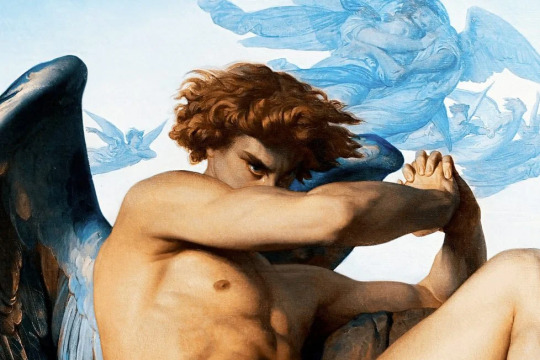
Note: This is inspired by both my own experiences with Lucifer and the information I read on @scarletarosa's blog and her devotional guide to him. Please go read that one too!!
The divine rebel, Lucifer is the light of truth and divine wisdom; an ancient light which shines through the darkness, representing illumination. He is the driving force of innovation, liberation and transformation. According to Scarletarosa, who actively works with Lucifer and was told this by him, he was the first-born god of the Universe created by the supreme deity, the Source. He is so incredibly ancient and beautiful. Lilith was created to be his counterpart, the Queen of Heaven. However, Jehovah took the throne of heaven from Lucifer and cast him and his followers into hell. Most of them lost their connection to heaven and their energy became dark and intense. Jehovah claimed the throne of heaven and set himself up as the one true god, manipulating humans into betraying their original deities. Thus, Lucifer became the King of Hell and has been scorned by Christians for millenia.
God of: Illumination, Light, Darkness, Change, Rebirth, Challenges, Innovation, Logic, Truth, Knowledge, Wisdom, Strategy, Persuasion, Revolution, Luxury, Pleasure, Freedom, The Arts and The Morning Star (“Morning Star” is another name for the planet Venus)
Symbols: Sigil of Lucifer, The Morning Star, Violins and Fiddles (instruments traditionally associated with him)
Plants and Trees: Rose, Belladonna, Mulberry, Patchouli, Myrrh, Min, Tobacco, Marigold, Lilies, Hyacinth, Sage
Crystals: Amethyst, Black Obsidian, Onyx, Garnet, Selenite, Rose Quartz
Animals: Black Animals in general, Dragons, Snakes, Owls, Eagles, Ravens, Crows, Rams, Foxes, Pigs, Bats, Rats, Moths, Swans
Incense: Rose, Frankincense, Patchouli, Myrrh
Colors: Black, Red, Silver, Emerald Green, Gold
Tarot: The Devil
Planets: The Morning Star, Venus
Day: Monday and Friday
Consort: Lilith
Children: Naema, Aetherea and many others

How was he traditionally worshipped?
There is not much to say about how Lucifer was historically worshiped seeing as he wasn’t worshiped at all for a large chunk of human history. He seems to have been worked with in some capacity according to the Gesta Treverorum, written in 1231, which is where we first see the term Luciferian being used to refer to his worship. This was by a woman named Lucardis for a religious circle, who was said to lament to Lucifer in private and prayed to him. However, the term Luciferians was later applied to basically any groups Christians didn’t like and wanted to fight, as one might expect. However, the modern Luciferian movement also sheds light on how Lucifer is worshiped. For Luciferians, enlightenment is the ultimate goal. Their basic principles highlight truth, freedom of will and fulfilling one’s ultimate potential, and encourage the same in all of us. Traditional dogma is shunned because Luciferians believe that humans do not need deities or the threat of eternal punishment to know what is good and the right thing to do. All ideas are to be tested before being accepted, and even then one should remain critical because knowledge is fluid and ever-changing. Regardless of whether Luciferians view Lucifer as a deity or an archetype, he is a representation of ultimate illumination and exploration in the name of personal growth.
Epithets
Phanes
The Morning Star
Light-bringer
The First-born
Prince of Darkness
Son of Morning
The Glory of Morning
Lord of the Lunar Sphere
The First Light

Offerings
Red Wine, Whiskey (especially Jack Daniels), Champagne, Pomegranate Juice, Black Tea (especially earl grey), Chocolate (especially dark chocolate), Cooked Goat Meat, Venison, Apples, Pomegranates, Honey, Good Quality Cigars, Tobacco, Daggers and Swords, Silver Rings, Emeralds and Emerald Jewelry, Goat Horns, Black Feathers, Seductive Colognes, Red Roses, Dead Roses, Crow Skulls, Bone Dice, Devotional Poetry and Artwork, Classical Music (especially violin)
Devotional Acts
Acts of self-improvement, spiritual awakening and evolution, knowledge-seeking and dedication to spirituality ; Shadow Work ; Working to overcome your ego to become wiser ; Defending those in need ; Working to better yourself without being too self critical ; Fighting against tyranny and bigotry whenever you encounter it
Altar Decorations
Black or Red Candles, Snake and Dragon Figurines, His sigil, Roses, Fancy Chess Boards and Playing Cards, Silver Jewlery and ornaments, Black feathers, Goat horns

Appearance
For me Lucifer usually appears as a tall light-skinned man with long fiery red hair (so red it looks like it’s been dyed), a sophisticated face with a killer jawline, passionate eyes and dressed in a fancy black suit. From all my experiences with him and what I’ve heard from other followers, it seems Lucifer and most demons dress in full suits and tuxedos.
Personality
Lucifer is nothing if not charming. He’s a protector first and foremost - one that always works to help you better yourself, but a protector nonetheless. He feels like a protective older brother taking care of you while your parents are away. He is a very complex entity, deeply wise and eloquent. He is more serious than one might expect for a demon given their popular depictions in our culture as chaotic forces of evil, but Lucifer is full of courage and love. I often feel him with me even when I’m not doing things related to him. He is proud of his follower’s accomplishments and congratulates them on a job well done, though he also reminds them that the job is never truly over. Growth is constant. Lucifer is the epitome of growth, blunt and gentle at the same time, telling you what you need to do and giving you space to figure out how to do it.
Lucifer values resilience, the pursuit of self-betterment, intellectualism, courage, open-mindedness and responsibility in individuals and wants to see his followers develop these qualities. He is constantly rooting for you to reach your full potential. He won’t hold your hand the entire way, but he will help you take steps in the right direction. Lucifer, like all deities, is different for everyone and will adjust his approach depending on your needs.
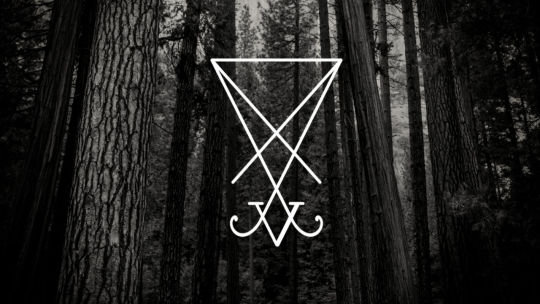
^ The Sigil of Lucifer
#deity work#witchblr#witch tips#spirit work#lucifer deity#lucifer devotee#luciferian#luciferian witch#lucifer morningstar
529 notes
·
View notes
Text
Banana. Fruit. Plant. Food. Sustains life for animals and humans alike. "And what are they putting in bananas these days?!" First of Aziraphale's magic words. Symbolic of plant life on Earth.
Fish. The ocean. Oysters. Sushi. "Why do you eat *that*?"/"It's what humans do." "Bouilla...bouilla...bouilla... baby... fish stew. Anyway!" Symbolic of marine life on Earth. Love. Sex. He probably wins prizes for his tropical fish.
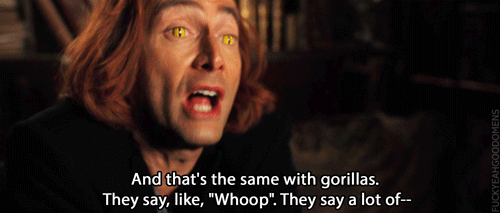
Gorilla. Also: Go-RILL-a, if you're Mr. Harmony. Animals. Ancient ancestors of humanity. Big fans of bananas; do not typically eat fish. (Rill. A small stream. Carries fish. Represents water, necessary to all life on Earth.) Gorillas represent the animal kingdom, the connection between animals and humans, and the interdependency of Earth's ecosystem. Earth is a balance of banana (plant life), fish (marine life), gorilla (animal life) and...
Shoelace. Humanity. First word in the sequence of Aziraphale's magic words that isn't a type of living thing but is, instead, an invention of the living thing it represents. Humanity is defined in Aziraphale's magic words by its bipedalism and its innovation-- by its ability to create, develop and use tools to improve its existence... but then also by their ability to keep refining, to keep trying, to keep progressing. Humans walk on two legs and created tools and created shoes to support that endeavor and then the shoelace to make the shoes better. Have you found the missing antichrist's name, age and shoe size yet? Humans walk-- they go ever forward, even if they sometimes go backwards. They are defined by their creativity and imagination and the determination to keep progressing. They create art and so they get a word full of symbolism because of their ability to make art and seek meaning and ask questions. Aziraphale loves them so.
(with a) Dash of Nutmeg. Civilization and evolution. Nutmeg comes from the nutmeg tree, in a full circle back to plant life. Dash of nutmeg is then the world created by these creative shoelaces. An ever-growing and changing world, full of refinement of and appreciation for life on Earth. A dash of nutmeg is learning and experimentation. Figuring out the right amount. Just a dash of nutmeg can change the whole taste of a dish and bring it to the next level. No nutmeg in a dish that needs it-- or too much? Not the same. No almond syrup where it's needed-- or too much? Not the same, maybe even a bit dangerous. To know that is to learn it... and to learn it is to either experiment yourself and/or to learn from the experience of humans. Aziraphale's love of being a student of humanity through the ages. Reading their books, absorbing their music and theatre. Letting them teach him French and magic and about food and love. A dash of nutmeg is literally the spice of life. To eat the right dish with just a dash of nutmeg is to experience the joy of life on Earth-- to experience pleasure from consuming the fruits of the Earth. It's living. It's to eat life alive.
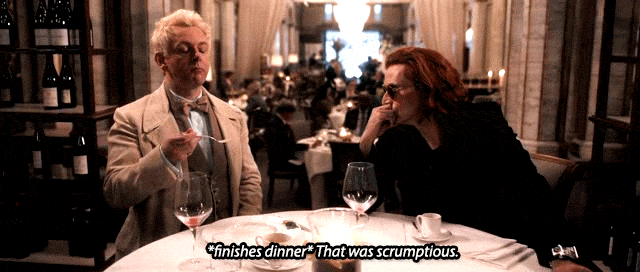
A hefty jigger. Doesn't exist. A jigger is precise, is quantifiable; a dash is a flick of the wrist and is less precise, more improvisational, just enough. You cannot have a hefty jigger. You can, though, always have a dash. See: nutmeg. See: almond syrup, as Nina pours into Aziraphale's coffee usual coffee order, as ordered by The Metatron. If you say 'dash' when you order in the shop but 'hefty jigger' when you deliver to your mark, you're wanting to look like a savvy, old man to the barista to get the order right... but you're intentionally attempting to look clueless to Aziraphale, to make him think he'll be needed to help you navigate humanity. It means you do know how to order coffee but you are pretending you do not to the person you are trying to manipulate. It means you're a liar.
A jigger is measured by shots. By the shot is one way you can order coffee. Coffee is freedom. Give me coffee or give me death. Give me liberty or give me death. Does anybody ever ask for death? Some wise-cracking asshole has to ask Nina for it at least once a week but she says no when The Metatron asks because no one ever *really* asks for death. Not seriously. Not as anything but a joke. They all ask for their beverage of choice. They all ask for freedom or comfort or pleasure or all of the above. Wanting to live is predictable to our villain but it's understandable to the rest of us. Living on this magical Earth can be a lot at times but it also is the most amazing thing imaginable.
No one knows that better than Crowley, who spans the gamut of coffee orders (among other beverages). Dessert coffee-- espresso, cream, maybe some alcohol-- in a small, Irish-coffee-style mug in 1.01 during a lazy afternoon lunch but also, on a stressful morning, this...
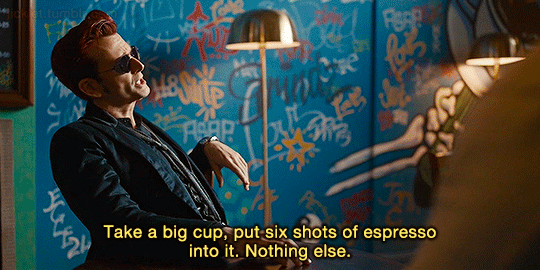
Mr. Six Shots of Espresso in a Big Cup. Crowley. But only sometimes. And not really. Not when we know him better than Nina does. Not when we've seen him twice order his symbolic liberty at a slower pace and cut it with some sweetness along the way. Not when The Bentley in S2 showed us that he drives fast, he pounds espresso, and it's all anxiety. Mr. Six Shots of Espresso in a Big Cup really wants to drive 52 miles an hour, per The Bentley, and slowly sip half a fluffy dessert coffee at lunch at The Ritz with Aziraphale. Crowley wants everyone to see him as Mr. Six Shots of Espresso in a Big Cup but he's not. He's...
Crowley. Bildad the Shuite.
Bildad. Means, quite literally, "old friend," as Sitis' mind translated upon his request. Aziraphale's oldest friend. Humanity's oldest friend. Also means "loved by the Lord." He's And the Voice of Frances McDormand's favorite, if only They'd put him out of his misery and share that. the Shuite. Means, as Michael points out, "from the land of Shua" but Michael doesn't really fully get it. It is not where you are from; it is not what kind of species you are. It is not what you "are", whatever that even is. Heaven, Hell, angels, demons, it's all... pointless, as Crowley tells Shax in 2.01. Bildad does not define Shuite as a place-related name; he does not define humanity as tied to beings of a specific region or to a species, even, really. Humanity is not the exclusive domain of people of any one race or ethnicity or religion or species. Being a Shuite isn't where you're from or if you are human only or if you have a human corporation but others call you an angel or a demon... Bildad defines Shuite as what you do or what you are learning how to do. He defines being a Shuite as how you're interacting with the world on Earth and how you are spending your days. Being a Shuite is something you *do* and freedom is the choice of what that is, which some unfortunately have more than others. What does Bildad *do* then, as *the* Shuite?
Bildad the Shuite. Professional midwife/cobbler. The demon who delivered humanity from The Garden of Eden, and who now lives among them, working hard as a professional shoemaker, helping them forward and letting them teach him just as much.
A shoelace. A human.
And like the rest of us, he's making this shit up as he goes. Nothing more human than that, really.
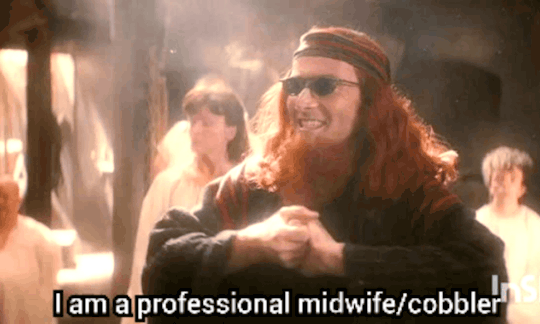
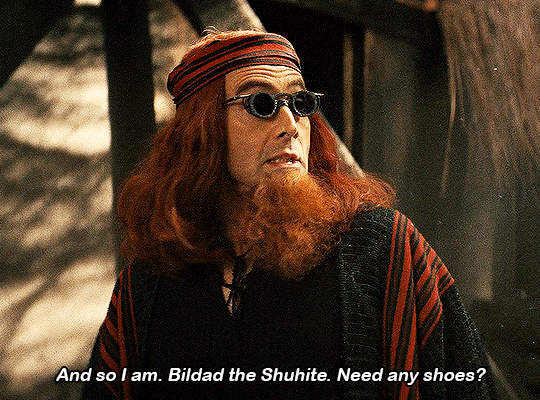
Banana, fish, gorilla, shoelace, with a dash of nutmeg. Aziraphale's magic words. His mantra. The only full prayer we've ever really heard him say. His history of Earth as he's observed and lived it with Bildad the Shuite for thousands of years. The words mostly work when he needs them to but sometimes they fail and that's okay. As a certain angel excited to be on Earth once said while pretending to be a human in the bookshop, the error they made just then proved they were human. It did, indeed, even if Muriel doesn't quite yet understand just how human they are.
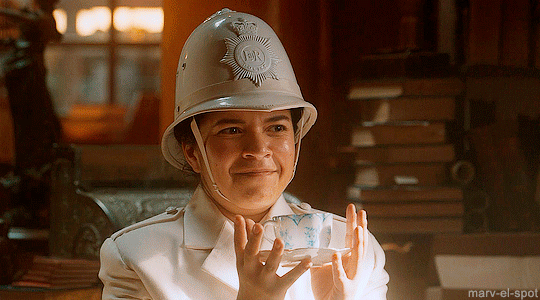
Nazis. Fascist motherfuckers who seek to suppress free thought and oppress others through dehumanizing violence. Can be expert lip readers. Can be multilingual. Can understand language on a technical, surface level that makes their inability to understand context very darkly funny. I am played for a sucker. You are played for a sucker. He, she, it are played for suckers... Dangerous as all hell in their willful ignorance, their lack of critical thinking and their complete lack of empathy.
Zombies. Those who are asleep to their surroundings. Those who do not seek to understand context and dive for deeper meaning. Those who do not engage with art (and, if they're Nazis, those who seek to suppress it.) Those who are full of apathy. Those who do not question. Those who think like how others tell them to think. Those who are content with surface understanding, not deeper meaning.
Flesheaters. Zombies-- in the horror movie sense. Those with a bloodlust for brains. Those who murder with impunity to satisfy a violent, dark hunger. Those with dark impulses that harm others; the polar opposites of hungering for pleasure from food, art, sex, love, companionship. The thematic opposites of Crowley and Aziraphale.
Nazi Zombie Flesheaters. Fraulein Greta Kleinschmidt, Mr. Harmony and Mr. Glozier. Multilingual members of the Nazi Party, one of whom is an expert lip reader. They are zombies, as shown by how they lack the imagination, intellectual curiosity, critical thinking skills, and creativity to be able to decode the deeper meaning of the surface words they read and recite correctly but do not actually comprehend. They do not seek to understand how a creative magic trick is being performed before their eyes because they fail to even notice that one is, even when presented with an abundance of contextual clues. They're also, in their cases, flesheaters. They roam around London eating innocent, free-thinking brains-- quite literally suppressing thought. In The Blitz, Part 1, they were already Nazi Zombies. In The Blitz, Part 2, they become the Nazi Zombie Flesheaters.
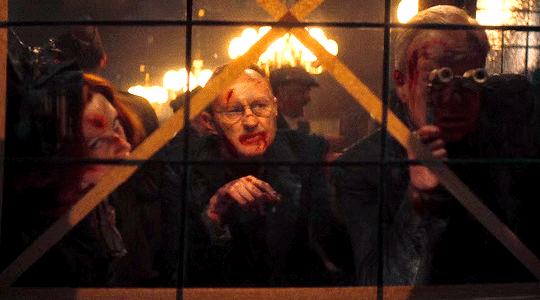
Jiggery-pokery. Cutesy-sounding British phrase with a darker origin. Means 'trickery'. Means 'deceit'. Not in an innocent way, like the sleight of hand deception of a magic show... or the sleight-of-hand tricks played by writers and performers on a television show with recurring motifs around spies and magic and wordplay and hidden romance and a whole secret language imbedded in its dialogue. Origin of jiggery-pokery: British Army, mid-1800s. Used to refer to homosexual sex acts, then illegal, amongst soldiers in its ranks when targeting them. Evolved a bit in modern times to a lighter-sounding term meaning cute trickery but still equally refers in definition to gay sex, conducted in secret, and by those who are then threatened with exposure by other soldiers who feel homosexuality goes against the morals of the unit. Used onstage by The Marvelous Mr. Fell to describe his complicated relationship with human magic, which metaphorical for his own humanity, in contrast with his role as one of God's soldiers, a moment before his partner gets on stage to perform some of that humanity with him. It is not performative, though, because humanity is not exclusive to humans; humanity is to be a Shuite and love is love. In the audience: a soldier from Bildad's unit and the Nazi Zombie Flesheaters, working in tandem to out Crowley and Aziraphale for what is, to Furfur and the Nazis, supernatural and actual jiggery-pokery.
Three cowry shells and a lone caraway seed. A sleight of hand magic trick, used by writers to point out multiple layers of meaning and a request of the audience to engage with the story and find the seed beneath the layers. A sleight hand of magic trick, used by The Marvelous Mr. Fell thousands of years prior in his exploration of human magic. He fooled ancient Egyptian Queen Nefertiti with the trick. He masks the lone caraway seed successfully beneath a different cowry shell than the one the humans watching him think it is hidden beneath. He hides one meaning beneath another. He hides his self-deemed jiggery-pokery humanity beneath what Heaven suspects of him as an angel.
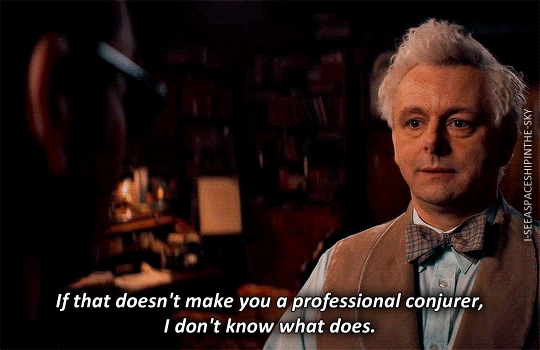
My Nefertiti-fooling fellow. What The Marvelous Mr. Fell's love, Bildad the Shuite, calls him to he remind him that his humanity is not jiggery-pokery. His magical man, who is also kind of terrible at the actual human magic part, but is so very good at the human magic part, and what could be more human than that?
Dummkopf. What Greta calls Harmony, after he successfully reads Aziraphale's magic words but she interprets them as nonsense words... despite them all seeing through the windows Aziraphale moving in such a way as to suggest he is performing a magic trick, suggesting a potential context for the words. None of these three have what the creative minds involved in Good Omens know their audience does have, which is the curiosity and love of story enough to look for context and meaning. 'Dummkopf': German for 'dumbass'.
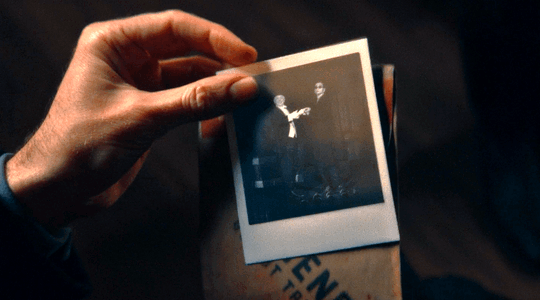
97 notes
·
View notes
Text
Talking about the Mötley Crüe tarot cards, and how perfectly they fit with each of the members cause I haven't seen anybody talk about this yet.
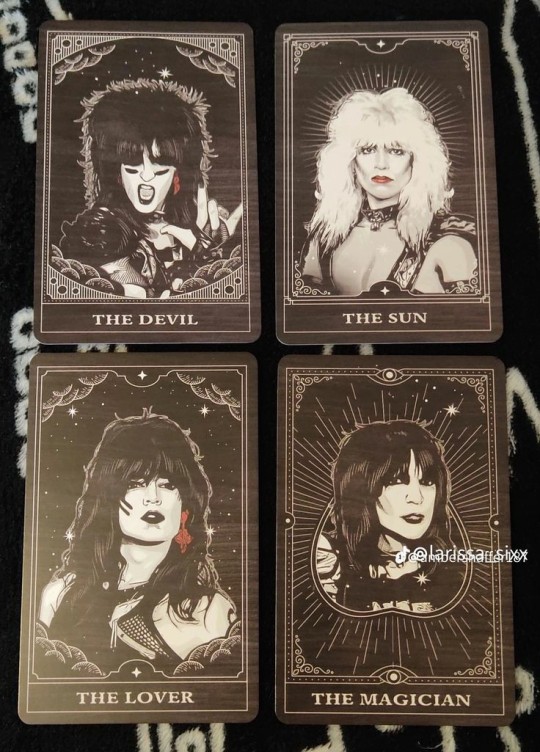
Nikki,the Devil - I think this one is pretty self explanatory. The devil (upright) represents addiction, oppression, dependency and powerlessness and this fits so well with young Nikki who was strung out on heroin and powerless in the face of his addiction.
The devil reversed however represents independence, freedom, release and the reclaiming of one's power which is perfect for older Nikki who gets over his addiction and reforms and metamorphosizes into a far better human being.
It's kinda funny because Nikki is the only one who's card has a more positive connotation when in reverse but I think this also represents how Nikki's life only really started looking up when he got older and kicked his addiction.
Vince , the sun - the sun upright represents confidence, optimism and success and Vince is obviously very confident and optimistic in his daily life and all of them are obviously very successful because of Mötley crüe.
The sun reversed though means pessimism, conceitedness and unrealistic expectations. When things don't immediately go Vince's way he becomes sulky and miserable, and things usually only don't go his way because he has unrealistic expectations, he either holds people or himself to too high a standard and gets fucked because they or he obviously couldn't live up to said expectation.
Vince can also be conceited he's very vain and empathises his self importance often throughout their entire career, and this fact has bit him in the ass multiple times.
Tommy , The Lovers - I know his card technically only says “the lover” but no such card exists, so I assume they just based it off the lovers which represents love (duh), balance, unity and choices.
Tommy has a lot of love to give and hands it out in spades to anybody who he's even passively liked or talking to. He also definitely brings a balance to the band that isn't talked about enough, in the early days he was definitely the middle ground for any spats between Nikki and Vince, listening and comforting them both in his own way and being fair by not picking a side and just hearing them out until he could eventually calm Nikki down and explain the situation better from Vince's point of view and vice versa. He also unionises the guys by by being this comfortable loving presence that's usually so understanding.
The lovers in reverse however means disharmony/chaos, imbalance and bad choices. We all know Tommy can be a very chaotic force to be reckoned with and this can cause imbalance in the established relationships that he has with the other members because yes he's quick to love, he's also quick to hate and sometimes without warning with how quickly his mood can change which can lead to a lot of confusion and disharmony. Also I don't need to tell you that Tommy has made some bad decisions in his life.
Mick , the magician - this card upright means willpower, resourcefulness, skill, and manifestation.
I've never seen a man with more willpower than Mick Mars who continued just doing the thing that he loves despite the pain and all the times he thought he wouldn't make it. He is extremely resourceful, in fact his resources were the only way they funded Mötley at the very beginning and he very clearly is a skilled guitar player.
The magician in reverse means cunning, wasted talent and deception/illusion.
Mick has always been open in his overwhelming determination to have a successful band and I think he's definitely screwed a few people over in his life because of this fact (like Mötley's rhythm guitarist and he definitely deprived his own children time with him because of this).
I don't think Mick wasted his talent, but if he got too comfortable in his suburban lifestyle then he definitely would have (and according to the dirt, he almost did).
Idk, this post probably won't interest anybody, but I just thought I should bring this up and explain how I saw why they picked the cards for the members.
56 notes
·
View notes
Text


"Grace" here is being used not in the Christian sense, but rather to broadly refer to the incredible power of human kindness, patience, and love. ❤
High-res closeups:
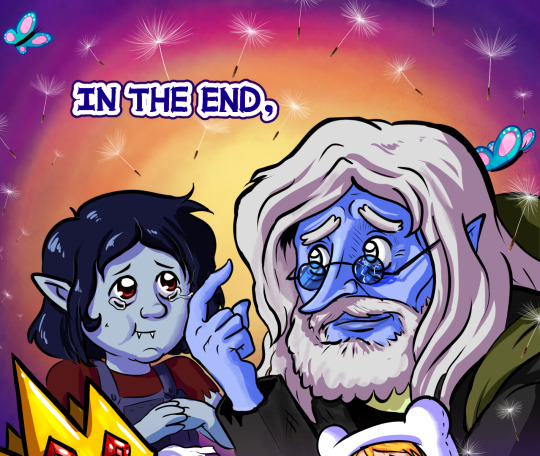
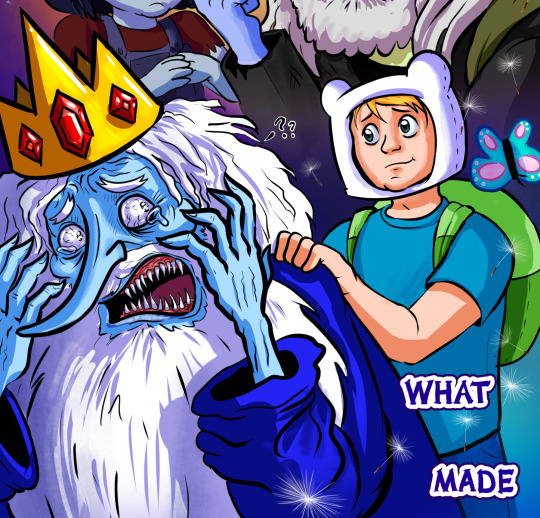
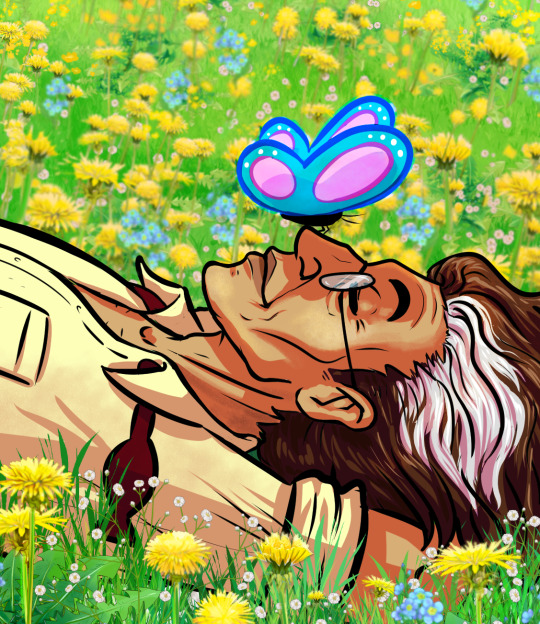
high-res full image (Google Drive link)
Flower language (or at least the flower language I am using):
Forget-me-nots: these little blue flowers are symbols of memory and remembrance, as well as true love, devotion, and, occasionally, senility
Baby's breath: these tiny white flowers symbolize new beginnings, everlasting love, freedom from corruption, happiness, and thankfulness
Dandelions: A cursory google search says these flowers represent "hope, healing, and resilience," which is apt. But I've included them here as a reference to their symbolism in Fionna & Cake. In this illustration, the field of dandelion puffs that Simon wakes up in at the end of the show has become a field of yellow dandelion flowers.
More analysis, if you're into that kind of thing:
1. I'm never going to get over the fact that Simon saved Marceline for no other reason than to save a child who needed his help, and in doing so - in showing up for his adopted daughter not just once but constantly and for YEARS - he basically saved the world. I think it was a brilliant move to use the narrative to further validate his actions in "The Star" episode of Fionna & Cake.
Marceline is the narrative opposite of Dean and Sam Supernatural.
2. Kindness has a way of spreading and coming back to us in ways we could never predict, which is one reason why I'm ALSO never going to get over how Simon saving Marceline eventually led to Marceline convincing Finn and Jake (and BMO and even Bubblegum) to be more empathetic to the Ice King, who becomes way safer and happier once he is not isolated in his madness.
Finn's kindness towards Simon, both before and after being cured, is a huge deal to me. It's a vital part of his character growth, and I like that Fionna had a parallel moment of growth with the Candy Queen.
Like, yes, it is big and important that Betty saved Simon. But what she couldn't do is love him in his madness. She was unable to love him if it didn't also cure him, and this destroyed her.
And so it is beautiful to me that because of Marcy and her friends, Simon was not left to suffer alone in the darkest depths of his senility. And I really love all the ways the show demonstrates how this deeply affected him even if it didn't make him remember who he was.
I believe this kindness shown to Ice King led to him having the confidence to stand up for himself and accidentally save the world AGAIN when Betty tries to kill everyone to "save" Simon in the Elementals finale because GOD FORBID WOMEN DO ANYTHING.
(Betty is our problematic Queen, and I absolutely love how she's written. The CW could NEVER. The MCU would sooner DIE. 90% of all prestige dramas can only DREAM of having such a complex and dynamic female character.)
3. And finally, there is that most recent and possibly most vital instance of grace of all in Simon's story: the kindness, patience, and forgiveness that he finally learns to start showing to himself.
Simon's is a tale of people being kinder than they have to be and the way that changes everything. I am extremely grateful that his story culminates in him learning that kindness and self-sacrifice are NOT the same thing, and that he deserves his own kindness as much as if not more than everyone else.
#my art#simon petrikov#alt-text#image description#adventure time#fionna and cake#fionna & cake#ice king#finn mertens#marceline#marceline the vampire queen#marceline abadeer#simon and marcy#simon & marcy#fanart#fan art#fionna and cake spoilers#finn the human#flower language#the star fionna and cake#marceline adventure time#the star adventure time#dandelions#simon adventure time#the star#Simon look out it's the butterfly of transgenderism!!!!!!! Simon!! watch out!!! ...oh no it got him!!!! :O
128 notes
·
View notes
Note
hiya! hope you doing well.
would you elaborate on the interpretation you were talking about in your Labyrinth post tags? what you said was really interesting and I never thought about it that way! 👀
also, hope you had fun watching! ✨✨✨
certainly.
i’d always been subscribed to the interpretation that the labyrinth is a metaphor for navigating coming of age, that the end of sarah’s hero’s journey is a means of balancing adult maturity with never losing a child’s sense of wonder and imagination. the fandom has thought up tons of explanations for where jareth falls in this scenario. is he a tangible antagonist, actively trying to get sarah to slip back into her old childish ways? a metaphor for adulthood, all that sarah is and isn’t ready for?
i think he’s all sarah’s creation. so does jim henson.
“He represents a lot of things that are a part of Sarah's world, what she's trying to figure out and what she's going through. … [Jareth] has no reality except what Sarah gives him, which she can constantly change.”
sarah seems to be very genre-savvy. she reads lines from a play titled the labyrinth, and she recognizes the puzzle of the two guards and implies she’s practiced it before in case she’d happen to encounter it. here, the labyrinth is a product of sarah’s fantasy, by which she navigates her adolescence and her parents’ divorce and her perceived lack of autonomy in a manner typical of a seasoned fantasy reader.
sarah is well aware that every fantasy hero needs a villain. the likeness she gives hers is that of her mother’s costar—as the former mrs. williams is a stage actress, shown in the photo on sarah’s vanity of her posing with a fellow actor who looks just like this jareth. sarah made jareth, made him as beautiful and dangerous as she believed he should be.
sarah made jareth.
to jareth, god is a sixteen-year-old girl.
imagine god, calling you by name, crowning you a king and giving you beauty and power. you were quite literally born for this. all you know is this role, building yourself and your kingdom just the way god wishes it.
then, god turns herself away from you.
you may feel betrayed. hollow, like you’ve been stripped of everything that makes you you. “you made me this way,” you might say.
Everything! Everything that you wanted, I have done. You ask the child to be taken, I took him. You cowered before me, I was frightening. I have reordered time, I have turned the world upside down, and I have done it all for you.
“i was playing the role you put me in. what was i made for, if not you?
i can’t live within you.”
Just fear me, love me, do as I say
“let me play the role of villain, the role you made me to fill.”
and I would be your slave.
“your will be done.”
god is a sixteen-year-old girl who hasn’t yet figured out the way she wants to be worshipped. it’s a heavy burden, trying to satisfy someone who doesn’t know what she wants.
but there is hope for jareth.
fandom rarely debates on how to interpret the barn owl at the beginning of the film. we’re pretty much in consensus that it’s a manifestation of jareth, but that’s never given much thought.
when sarah asserts her power and escapes the labyrinth, jareth has once again taken the form of the owl. in the final scene, when sarah celebrates with her friends from the labyrinth, reconciling her love of fantasy with her maturity and self-growth, jareth flies away, smaller and smaller until he’s gone. here we turn to the age-old metaphor of flight as freedom.
in moving away from escapism and becoming an active participant in her own life, sarah has freed jareth from the role of villain. none of the friends in her room are human. be reminded again that jareth bears the likeness of a man present (at least tangentially) in sarah’s real life, who would likely feel disheartened knowing he’s blamed for something beyond his control.
because sarah has no more need for a jareth, there is no more jareth. and that’s arguably best for both of them.
(p.s.: i go to the theater tomorrow! i have a sarah-esque outfit put together and everything. thanks for wishing me well & know tomorrow can’t come soon enough for me… this film has been among my favorites for many many many years and each watch makes me find more to love. best cult i’ve ever joined)
#labyrinth#jareth#jareth the goblin king#labyrinth 1986#the labyrinth#sarah williams#marshfellow#jim henson#sarah labyrinth#jennifer connelly#david bowie#labyrinth movie#labyrinth fandom#i went on such a rant i’m sorry i just love thinking about this movie in new ways#pleeeeease talk to me about it i’ll be normal i promise 😀#mina.txt
40 notes
·
View notes
Text
TMNT Name meanings
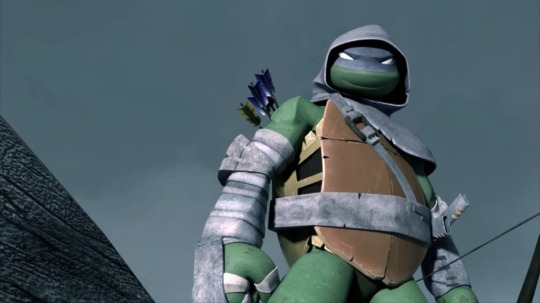
Leonardo - The name Leonardo means, (and I am pretty sure you can all guess), "Brave Lion."
For a fearless leader, the name Leonardo, was perfect for Leo's character. It suits him well in every TMNT that has ever been, even in the 2018 version.
Being fearless is what Leo is most known for, it is why his younger brothers look up to him and why Raph nicknamed him, "Fearless."
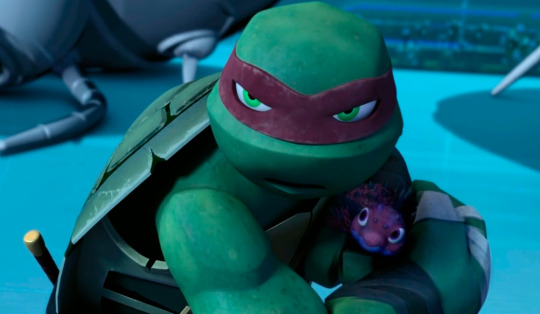
Raphael - The name Raphael means, "God has healed"
Even though I doubt the turtles were raised to believe in God and were more raised in buddhism since that is most likely Splinter's religion. I think the name Raphael is suiting for a protector like him.
Think about it, "God has healed" meaning, God is always watching over you and is always ready to help you when you need him.
You just got to have a little faith.
Even though his brothers questioned him sometimes because of his lack of control over his temper, you can still always count Raphael to be there to stand beside you and protect you when you are in danger.
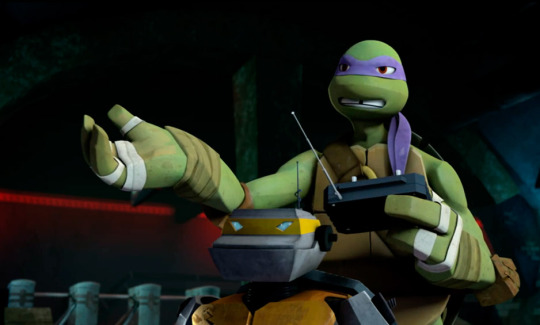
Donatello - The name Donatello means, "Given; Gift from God"
As we all know Donnie if very gifted, so this name is very, very suiting and you know what, not just that but he is like a gift to the world. With Donnie and his brains, he holds the power to change everything.
Make the world a better place and is always able to find a solution to problems. Without Donnie and his gifts, his brothers wouldn't have the equipment they needed for the Kraang or any other threat and they could have come home dead without Donnie's doctor skills.
So yeah, Donnie is gifted but he is also a gift for everyone else.
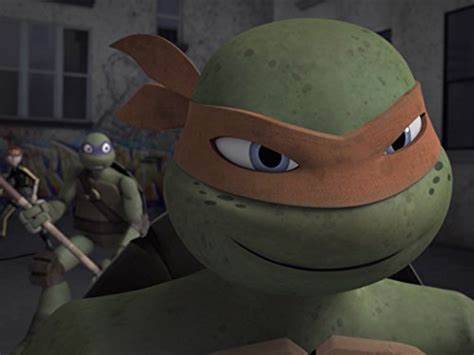
Michelangelo - The name Michelangelo means, "He who resembles God"
This name is really, really suiting for Mikey. I know a lot think Mikey is just the goofball in the group, but he isn't.
He isn't the weakest link, he isn't just the baby brother, and he is not useless.
Mikey does a lot more than others think. He gives his family hope and faith when they can not find it for themselves. He is his brothers' strength. Mikey is always there to make sure no one falls in despair and keeps them forward.
He gives his family constant support, comfort, and he always watching their backs.
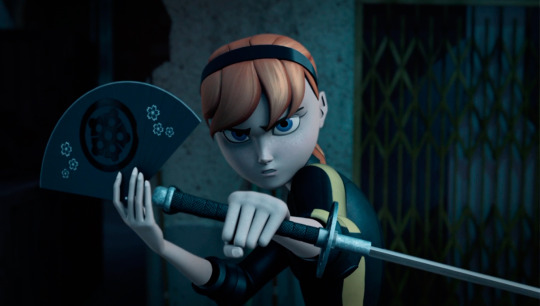
April - The name April means, "To open." - O'Neil - and the name O'Neil means, "Champion."
April I think is a good name because, "To open" meaning the opening of Spring which means like rebirth.
Think about how April was just a normal girl who had a normal life but then she meets the turtles and suddenly her whole life begins to change but she does as well. She went from a normal teenager girl to a half alien, psyche power kunoichi with mutant friends.
As for O'Neil, I think that is suiting as well because we all know that April is driven, and she will not stop until she becomes victorious.
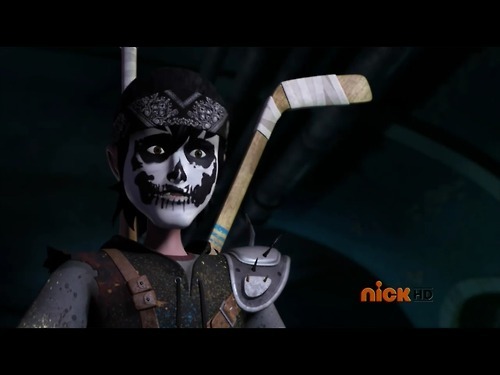
(Pretty sure Casey's first name is Arnold so going start from there)
Arnold - The name Arnold means, "Ruler, strong as an eagle" - Casey - The name Casey means, "Brave in battle" - Jones - The name Jones means, "Son of John or Yahweh is gracious"
Arnold is suiting because despite his flaws and over-confidence, he is as strong as an eagle. He is full of freedom and holds the power for this need to protect others. He is always keeping a watchful eye, like many Vigilantes.
Casey, is always Brave in battle. He never shies away from it, only straight towards it.
As for Jones, Casey is gracious he is kind and courteous.
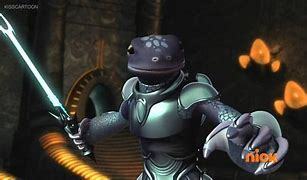
Monalisa - The name Monalisa means, "Beauty." - Painting represent - Cosmic link connecting humanity and nature
Monalisa is a beautiful woman, not just in appearances but spirit as well. She is so brave, so straightforward, and selfless. A true warrior.
As for the name painting, she is named after, even though Mona is not human, she still represents humanity.
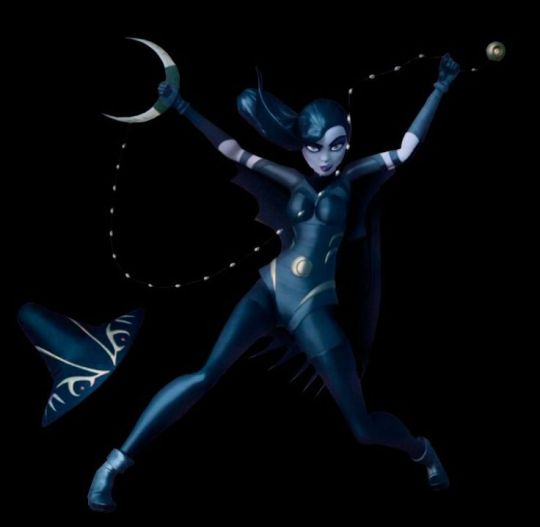
Shinigami - The name Shinigami means (Which we all know), "Angel of Death."
Shinigami is a true force to be reckoned with, even though we have never seen her do it, she is shown that she will not hesitate to end someone's life and she seems to be the type who does not fear death for herself either.
She is not evil, just has evil traits and she only brings the fear of death to those who deserve it.
You know I had to save the best for last...
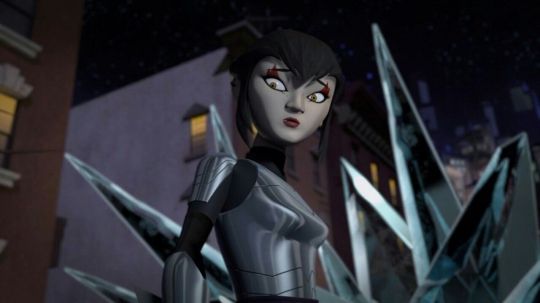
Miwa - The name Miwa means, "Beautiful Harmony" Karai - The name Karai means, "Spicy, sever, hot."
Miwa, I think was the perfect name for her! I know a lot of people like Karai and believe that she would never change her name to her real name, but I believe otherwise.
The name Miwa is way more suiting for this character than Karai. It may not sound as evil or as cool as Karai, but that name is suiting for the past Karais before 2012.
For this version of Karai, Miwa is better and I think I know why they chose that for her real name.
"Beautiful Harmony,"
Karai is Harmony. She is always in between, never one or the other.
What I mean is, she is not quite Foot Clan but not Hamato Clan either, she is not really a villain but not really a hero, and she is not really mutant but not really human either.
Everything about this Karai is always in the middle! She is everything! She is Foot and Hamato. She is a hero with villainess traits, and she is a mutant that can transform back into human!
I like to think that while Karai does not think or love Shredder as her father anymore, I like to think of her as the daughter of three clans, (including Tang Shen)
She has the spirit of her mother which we all know, but she has the heart of a warrior like her father, and she has the skills of a Foot solider like Shredder.
I believe Karai will accept the fact that she can not escape the things she has learned for Shredder, but she can take what she has learn and make it better. I don't believe Karai would want to stay Karai because Karai is no longer who she is.
Karai was a ruthless vengeful villain, she was Shredder's daughter, and a powerful weapon for the Foot clan.
Miwa is no longer vengeful or hateful, she was Hamato Yoshi's and Tang Shen's daugher, and she was no one's weapon or tool.
Miwa is Karai's future and Karai is Miwa's past.
(I love Karai so much as you can probably tell)
I do not like the name meaning for Karai, I don't really think they thought that name through either like Saki's name. The only one I agree with is sever, that's suiting. But spicy and hot?
I don't know. I don't like it.
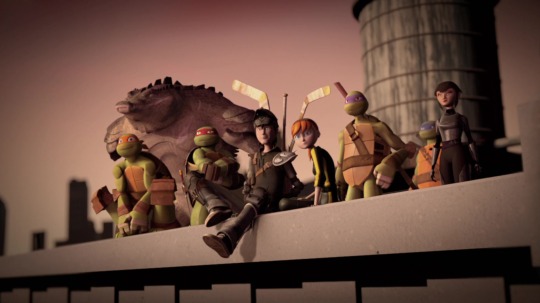
So that's the end of that.
I just love it when names fit the character, that's why I am always so nit-picky about names and why I always change them, is because I want it to be perfect for the character. I don't like picking random names just because I think it sounds good.
When you make a character, you can't just like throw stuff together, you know?
You have to think it through. You got a think about appearances, personality, the clothes they wear, the things they like, physical movements, their name!
Every little thing is important. It makes the character who they are! That's why when I watch shows or read books, I pay attention to every little detail. I don't just like the character because they are strong, or I think they look cool; I have to like everything about the character.
People put so much thought and work into their characters and for people, like my dumb brother, to say that's my favorite character because they look cool and are a lot stronger than the others. I think is just disrespectful to the creator. I do.
There is so much to the character than just looks and fighting abilities. I lot of things that they worked hard on, so you can get to know the character, you know? They make the character to be someone you can relate to.
Like Karai is my favorite character, not because she is a badass but because I relate to her so much! I never been through the amount of what she has been through, but I know what is like to have an unloved parent, to be in someone else's control, for your whole world to fall apart in an instant, to lose someone important to you, and to be angry and hateful.
I had to rediscover myself because I never had the chance to before and I am still trying to figure myself out.
Karai was my comfort character through those times because watching her, going through worse than me and still going on fighting, just gave me hope. I know that may sound stupid, because she is not real, but it is true.
(Sorry if I was too much there, I am just really passionate about stories and characters)
#tmnt 2012#tmnt karai#tmnt leo#tmnt donnie#tmnt mikey#tmnt raph#tmnt april#tmnt casey#tmnt mona lisa#tmnt shinigami#name meanings
46 notes
·
View notes
Text
metaphors in hozier's 'would that i'
the song doesn't make a lot of sense until you decode the metaphors he uses in it, but then it all clicks. the use of extended metaphors for his present and previous lovers is really important and significant because it tells the listener a lot about how he experiences these different loves in very different ways, and why his current love isn't 'just another date', but something entirely new that he values very highly and cherishes to the point that he 'worships' it.
hozier compares his past loves to plants - he describes his past lover as having 'hair like the branch of a tree' and calls her a 'willow', and, when talking about forgetting other loves in the wake of his current lover, he says that he watches 'still living roots' be destroyed. plants are beautiful, but they require a lot of care. there's a specificity to each type of plant, because different plants have different needs in terms of water, types of food, mineral content, soil pH, and the list goes on. it's easy to accidentally kill plants with just one misstep. they are delicate and difficult and progress is slow because it takes years and years for trees to grow and reach their full potential, start producing fruit, etc. hozier is saying that his past loves were a lot of work and they didn't give anything back easily, even though he had to give them everything to try and make them work.
by contrast, hozier calls his new love 'the fire', 'flames', and so on. fire is wild, all-consuming, and can be terrifying. but fire is also powerful and free. when we think about fire, we mostly think about destruction - wildfires or burning buildings or similar disasters - but fire is also life. before human ancestors had fire, they were cold and vulnerable and in the dark. but, after fire, their survival was completely revolutionised: it was an entirely new way of life. for the first time, they could control when it was light; they could keep warm in the winter; they could cook food, and, subsequently, their diets were transformed; they could protect themselves much better from predators. fire represented energy, innovation, life. yes, it was dangerous. but it was also majorly useful and ultimately it was something they needed, not just to stay alive, but to live. to call your love not just a fire but the fire - as in, the first fire, the only fire, the fire to rival all other fires - is to call it the introduction of warmth, protection, light, growth, energy, and power; it is to call it the biggest advancement possible in your lifetime; it is to call it the single root cause of a metamorphosis. the speaker is commenting that this newest love has entirely changed the way that he sees and experiences love.
the metaphors also allude to the speaker's own inner turmoil and problems with love and loving. when hozier talks about his prior trysts, he uses precise, controlling language: he's very specific when he talks about exactly what the relationship was and how it worked in his first verse, detailing what was 'under' him and what was 'over' him. then, in the next verse, he repeats the verb 'must', giving that verse a desperate, urgent tone. 'must' is a harsh verb and it doesn't leave much room for debate. the level of control that hozier is exerting (or, at the very least, trying to exert) over this relationship is made clear linguistically, but is also mimicked in that extended metaphor of the willow tree. taking care of them is long, hard, and mostly fruitless work, and maybe he even feels like it's his duty to take control of the relationship because he feels that his lover needs that control, maybe because she isn't giving him anything much back, just like that volatile, hard-to-care-for willow tree. that same verse sees an allusion to the time that he 'fretted fire', and, if the tree is control and stability, then surely fire is the opposite - anarchy and disorder? - except that he comes to see fire as freedom. he manages to let go of the need to be in control. he finds a relationship where he doesn't need to be the one doing everything: he doesn't address his past lover(s) at all (perhaps he knows it's pointless, since they won't respond?), instead talking about them passively, but he does talk a lot about what he does, relying heavily on first person singular pronouns. in the fourth verse, he addresses someone else for the first time - his 'flame' - personally, and the fifth verse is entirely directed at her. he talks about her actually taking action, actually doing things. when he says that she 'licked off the grain', i think that he is alluding to her taking all of his bad memories, all of his felled willow (and other?) trees, and simply taking away the rough, uneven parts (the grain), leaving him with the smooth wood, and that she is able to do this because he no longer has any reason to lament his past failures in love - he has his 'flame', and the trees of his past can't use their roots to trip him up or push their branches in his face any more, and so he is simply left with happy memories, the best of his ex-lovers, whatever is left that he can still appreciate and be thankful for. and that's significant because he's found a love who has helped him let go of the need for control. he doesn't need to control the relationship any more, for his sake or for his lover's, because she is here and she is willing to do things with him and for him and give back to him and help him to be free, and offer him warmth and protection and energy and all these things that fire is, and he doesn't need to do anything except love her back, because fire only needs one thing to stay alive, and everything else simply becomes fuel. if his love is her flames' version of oxygen, then everything else is just flammable material. nothing he does can make her stop loving him because fires aren't difficult to keep alive, they are difficult to put out. fires don't need food with specific mineral ratios or a certain volume of rainfall or the right soil pH. they just burn. she just loves him - that is what she does. and he watches 'in awe' because that kind of unconditional love is so far removed from his carefully-measured, carefully-controlled previous relationships.
and those last two lines of the last verse are so beautiful: "long as amber of ember glows/all the 'would that i'd loved' is long ago". he's saying that even when the flame burns out, even if she stops loving him, even if she is dead and gone and buried, the freedom that she gave him will remain in the 'amber', that beautiful colour linked to energy and the sun and wealth (because isn't that what love is?), of the last, residual 'ember', the dwindling remains of the love and freedom they shared. and as long as he can hold onto that freedom, even if it does dwindle down to embers and ashes - treasured memories and the fears that you'll forget what their smile looked like or the way they scrunched their nose when the disliked something or the cute expression they assumed when focussed - then he never has to go back to feeling like he needs to grip onto a half-hearted relationship, where he must always be responsible and in control and doing.
but yeah i just love that fire metaphor. can you tell??? probably not
#hozier#would that i#wasteland baby#andrew hozier byrne#lyrics#lyricism#metaphors#food for thought#analysis#song#song analysis#lyric analysis#fire emblem#plants#willow trees#love
28 notes
·
View notes
Text
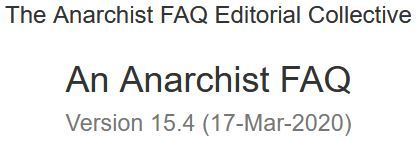
A.2.13 Are anarchists individualists or collectivists?
The short answer is: neither. This can be seen from the fact that liberal scholars denounce anarchists like Bakunin for being “collectivists” while Marxists attack Bakunin and anarchists in general for being “individualists.”
This is hardly surprising, as anarchists reject both ideologies as nonsense. Whether they like it or not, non-anarchist individualists and collectivists are two sides of the same capitalist coin. This can best shown be by considering modern capitalism, in which “individualist” and “collectivist” tendencies continually interact, often with the political and economic structure swinging from one pole to the other. Capitalist collectivism and individualism are both one-sided aspects of human existence, and like all manifestations of imbalance, deeply flawed.
For anarchists, the idea that individuals should sacrifice themselves for the “group” or “greater good” is nonsensical. Groups are made up of individuals, and if people think only of what’s best for the group, the group will be a lifeless shell. It is only the dynamics of human interaction within groups which give them life. “Groups” cannot think, only individuals can. This fact, ironically, leads authoritarian “collectivists” to a most particular kind of “individualism,” namely the “cult of the personality” and leader worship. This is to be expected, since such collectivism lumps individuals into abstract groups, denies their individuality, and ends up with the need for someone with enough individuality to make decisions — a problem that is “solved” by the leader principle. Stalinism and Nazism are excellent examples of this phenomenon.
Therefore, anarchists recognise that individuals are the basic unit of society and that only individuals have interests and feelings. This means they oppose “collectivism” and the glorification of the group. In anarchist theory the group exists only to aid and develop the individuals involved in them. This is why we place so much stress on groups structured in a libertarian manner — only a libertarian organisation allows the individuals within a group to fully express themselves, manage their own interests directly and to create social relationships which encourage individuality and individual freedom. So while society and the groups they join shapes the individual, the individual is the true basis of society. Hence Malatesta:
“Much has been said about the respective roles of individual initiative and social action in the life and progress of human societies … [E]verything is maintained and kept going in the human world thanks to individual initiative … The real being is man, the individual. Society or the collectivity — and the State or government which claims to represent it — if it is not a hollow abstraction, must be made up of individuals. And it is in the organism of every individual that all thoughts and human actions inevitably have their origin, and from being individual they become collective thoughts and acts when they are or become accepted by many individuals. Social action, therefore, is neither the negation nor the complement of individual initiatives, but is the resultant of initiatives, thoughts and actions of all individuals who make up society … [T]he question is not really changing the relationship between society and the individual … [I]t is a question of preventing some individuals from oppressing others; of giving all individuals the same rights and the same means of action; and of replacing the initiative to the few [which Malatesta defines as a key aspect of government/hierarchy], which inevitably results in the oppression of everyone else … “ [Anarchy, pp. 38–38]
These considerations do not mean that “individualism” finds favour with anarchists. As Emma Goldman pointed out, ”‘rugged individualism’… is only a masked attempt to repress and defeat the individual and his individuality. So-called Individualism is the social and economic laissez-faire: the exploitation of the masses by the [ruling] classes by means of legal trickery, spiritual debasement and systematic indoctrination of the servile spirit … That corrupt and perverse ‘individualism’ is the straitjacket of individuality .. [It] has inevitably resulted in the greatest modern slavery, the crassest class distinctions driving millions to the breadline. ‘Rugged individualism’ has meant all the ‘individualism’ for the masters, while the people are regimented into a slave caste to serve a handful of self-seeking ‘supermen.’” [Red Emma Speaks, p. 112]
While groups cannot think, individuals cannot live or discuss by themselves. Groups and associations are an essential aspect of individual life. Indeed, as groups generate social relationships by their very nature, they help shape individuals. In other words, groups structured in an authoritarian way will have a negative impact on the freedom and individuality of those within them. However, due to the abstract nature of their “individualism,” capitalist individualists fail to see any difference between groups structured in a libertarian manner rather than in an authoritarian one — they are both “groups”. Because of their one-sided perspective on this issue, “individualists” ironically end up supporting some of the most “collectivist” institutions in existence — capitalist companies — and, moreover, always find a need for the state despite their frequent denunciations of it. These contradictions stem from capitalist individualism’s dependence on individual contracts in an unequal society, i.e. abstract individualism.
In contrast, anarchists stress social “individualism” (another, perhaps better, term for this concept could be “communal individuality”). Anarchism “insists that the centre of gravity in society is the individual — that he [sic] must think for himself, act freely, and live fully… . If he is to develop freely and fully, he must be relieved from the interference and oppression of others… . [T]his has nothing in common with… ‘rugged individualism.’ Such predatory individualism is really flabby, not rugged. At the least danger to its safety, it runs to cover of the state and wails for protection… .Their ‘rugged individualism’ is simply one of the many pretences the ruling class makes to mask unbridled business and political extortion.” [Emma Goldman, Op. Cit., pp. 442–3]
Anarchism rejects the abstract individualism of capitalism, with its ideas of “absolute” freedom of the individual which is constrained by others. This theory ignores the social context in which freedom exists and grows. “The freedom we want,” Malatesta argued, “for ourselves and for others, is not an absolute metaphysical, abstract freedom which in practice is inevitably translated into the oppression of the weak; but it is a real freedom, possible freedom, which is the conscious community of interests, voluntary solidarity.” [Anarchy, p. 43]
A society based on abstract individualism results in an inequality of power between the contracting individuals and so entails the need for an authority based on laws above them and organised coercion to enforce the contracts between them. This consequence is evident from capitalism and, most notably, in the “social contract” theory of how the state developed. In this theory it is assumed that individuals are “free” when they are isolated from each other, as they allegedly were originally in the “state of nature.” Once they join society, they supposedly create a “contract” and a state to administer it. However, besides being a fantasy with no basis in reality (human beings have always been social animals), this “theory” is actually a justification for the state’s having extensive powers over society; and this in turn is a justification of the capitalist system, which requires a strong state. It also mimics the results of the capitalist economic relations upon which this theory is built. Within capitalism, individuals “freely” contract together, but in practice the owner rules the worker for as long as the contract is in place. (See sections A.2.14 and B.4 for further details).
Thus anarchists reject capitalist “individualism” as being, to quote Kropotkin, “a narrow and selfish individualism” which, moreover, is “a foolish egoism which belittles the individual” and is “not individualism at all. It will not lead to what was established as a goal; that is the complete broad and most perfectly attainable development of individuality.” The hierarchy of capitalism results in “the impoverishment of individuality” rather than its development. To this anarchists contrast “the individuality which attains the greatest individual development possible through the highest communist sociability in what concerns both its primordial needs and its relationships with others in general.” [Selected Writings on Anarchism and Revolution, p. 295, p. 296 and p. 297] For anarchists, our freedom is enriched by those around us when we work with them as equals and not as master and servant.
In practice, both individualism and collectivism lead to a denial of both individual liberty and group autonomy and dynamics. In addition, each implies the other, with collectivism leading to a particular form of individualism and individualism leading to a particular form of collectivism.
Collectivism, with its implicit suppression of the individual, ultimately impoverishes the community, as groups are only given life by the individuals who comprise them. Individualism, with its explicit suppression of community (i.e. the people with whom you live), ultimately impoverishes the individual, since individuals do not exist apart from society but can only exist within it. In addition, individualism ends up denying the “select few” the insights and abilities of the individuals who make up the rest of society, and so is a source of self-denial. This is Individualism’s fatal flaw (and contradiction), namely “the impossibility for the individual to attain a really full development in the conditions of oppression of the mass by the ‘beautiful aristocracies’. His [or her] development would remain uni-lateral.” [Peter Kropotkin, Anarchism, p. 293]
True liberty and community exist elsewhere.
#faq#anarchy faq#revolution#anarchism#daily posts#communism#anti capitalist#anti capitalism#late stage capitalism#organization#grassroots#grass roots#anarchists#libraries#leftism#social issues#economy#economics#climate change#climate crisis#climate#ecology#anarchy works#environmentalism#environment#solarpunk#anti colonialism#mutual aid#cops#police
22 notes
·
View notes
Text
THT True Love and Double Trouble Remix Part 1.

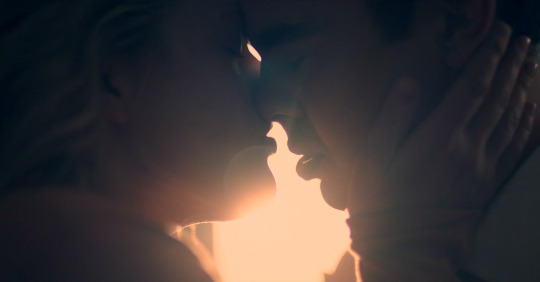
Over the next few mixes I’m going to talk about the embodiment of themes and concepts in character constructs, in particular for the participants of our infamous Handmaid’s Tale love triangle, Nick, June and Luke. I first wrote about Nick and June’s character concepts in Nick’s Playlist last year, but let’s face it ALL of these characters are intimately bound to one another and it’s finally time to talk about how and why. Welcome to the True Love & Double Trouble Remixes.
JUNE

In general when constructing a character for the purpose of telling a story, they’re written with themes and concepts in mind which form their history, motivation, journey and final destination. In Atwood’s text June is meant to represent the everyday woman, nameless, caught up in the whirlwind that is Gilead. She acts as an unreliable narrator, providing her unique perspective that seems simultaneously fantastical and horrifically true. She is propelled from a life of relative peace and tranquility into one of slavery and subjugation. Gilead’s expectations and restrictions are used throughout to not only contrast against our understanding of basic freedoms, but also highlight an existing undercurrent of societal gender bias in June’s pre Gilead life. She engages in acts of rebellion that give her a sense of freedom and ultimately launch her into unknown territory. In the series June transforms from someone who’s “not that kind of person” into Gilead’s worst nightmare….hope.

Those stolen from a free country and forced to live in slavery, still recall their liberty and therefore relentlessly seek it through constant acts of rebellion. A generation born into it however, may easily be taught to accept it as ordinary, as Aunt Lydia observes in S1; given time the abnormal will become the new normal. When June smuggles out a plane load of children, she steals Gilead’s ability to normalise its fascist ideals in the next generation. It gives those trapped in Gilead hope and in S4 and 5 we see Gilead’s relentless campaign to eliminate her, extinguishing her legend and therefore any ensuing acts of rebellion.

In S4 when Osborne is recaptured as a handmaid her notoriety and subsequent incarceration is used to create a loss of hope amongst the Handmaids. If June Osborne a handmaid of such repute can be bridled by Gilead, their power must be complete. By the same logic, once June Osborn escapes their grasp, her freedom cannot be tolerated.
June represents the spirit of rebellion who along with Nick Blaine, gives birth to her countries future liberty; Holly. June reclaims her sexual freedom in the form of her relationship with Nick, but it’s not just sex, it’s the seeds of rebellion, liberty and love that are being sown here. Her bond with his character is a clear statement about her need to journey into deeper personal uncharted territory, in order to achieve freedom. It’s a message about the necessity of love to sustain us as human beings, the need for community and family, and how intimately these are tied to free will. As their relationship crystalizes his sense of freedom and her power grows.
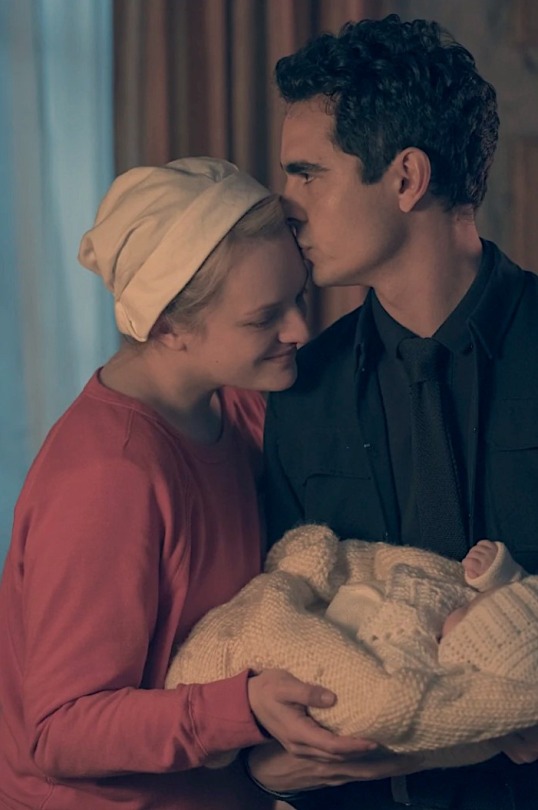
“No one dies from lack of sex, it’s lack of love we die from”, “Grab love wherever you can find it” June states as her relationship with Nick deepens. The tenor of these statements and the recording to Luke “I am ashamed……..He helped me to survive” speak loudly of a sense of guilt that she has found love somewhere else, painting it as a matter of sheer survival. Despite this when June returns to Canada, Luke becomes increasingly aware that far from being merely a matter of necessity, this bond is actually something much, much more. He grows to understand that his wife’s view of him as a “complete” partner has been permanently changed and that he would actually never be enough for her. Luke epitomizes the country June left behind, a landscape she now finds alien and uncomfortably unfamiliar.
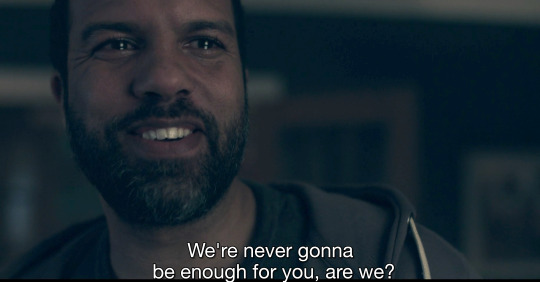
Instead of grieving acceptance, we see June’s growing desperation and distress that the daughter she conceived in a once free country is now slowly being swallowed by Gilead’s maw. In the S4 bridge scene, Nick assures her that Hannah still loves and remembers her but it’s debatable as to whether this is true, or she is much like her country slowly falling under Gilead’s spell. Throughout S4 and 5 there are several moments that Nick and Hannah are mentioned, together they represent the figurative “reward” June will receive once Gilead is defeated. Lawrence flaunts Nick in an attempt to have June submit to Gilead but it’s nothing but Fools gold, for neither of them will be truly free.
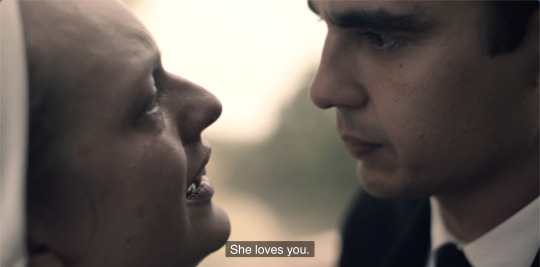
June is like a barometer, an indicator of the shifting winds of change. While she stays in Canada with Luke, the spirit of rebellion lies dormant, like the gun she buries in the snow. Lawrence observes that she is “losing her edge”, meanwhile Gilead grows in strength and the people she left behind are bent to its will. We see Hannah begin schooling to be a wife, Janine demonstrating a new level of compliance and Nick is swallowed by his surrounding influences, “groomed” by Lawrence to become a dutiful and brutal fledgling commander. These characters say a great deal about Gilead’s power structures. Hannah represents a new generation of believers, Janine; the walking manifestation of all the horrors Gilead visits on the Handmaids. Nick represents the next generation of the power structure, its ability to exercise will and force, he’s “a puppy” in training.

As June breaks her bond with Luke and Canada, we see these influence of Gilead’s power begin to crumble. Hannah remembers her name and writes it down. Nick rejects his allegiance to Gilead completely, sacrificing everything for those he loves. And Janine refuses to comply with Aunt Lydia’s demands no matter what the cost. June’s relationship with both Luke and Nick are designed to signify two separate states of grace (passivity or rebellion) and as the season’s progress, and she develops her relationship with each counterpart, we see a distinct shift from one state to the other. The nature of the love she has for each is noticeably different too; her love for Nick is romantic, passionate and enduring, while Luke conjures feelings of devotion and commitment.
Throughout S5 we watched June attempt to return to her “home” finding instead distant memories and simmering tension, which comes to a boil in ep10 as we hear her say “America wasn’t Gilead until it was. We have to run. Now.”

In Ep 10, Luke bids June farewell, finally acknowledging her autonomy in the form of her maiden name. It signified a breaking of this bond with her former life and a return to her original state of independence. S5 Ep 10 is the metaphorical Tabula Rasa for all of these characters. Everything they have attempted to build is rubble, their homes are gone and they have been scattered to the wind.
June tells Holly on the train “we’re going to a beautiful island”, Hawaii the recurring elusive destination of idyllic safety. But she is shortly confronted by Serena, promptly reminding her that the ghost of Gilead will follow her, no matter where she runs to. As Nick so succinctly says “they’ll keep coming for her….”

Back soon with the second installment in our latest remix.
#handmaids tale#june osborne#june x nick#nick x june#the handmaids tale hulu#osblaine#elisabeth moss#max minghella#hulu streaming#nick blaine#THTplaylists&mixtapes#love triangle#the handmaids tale#hulu tv#tv series#analysis#luke bankole
26 notes
·
View notes
Text
"The Wounded Sky" review
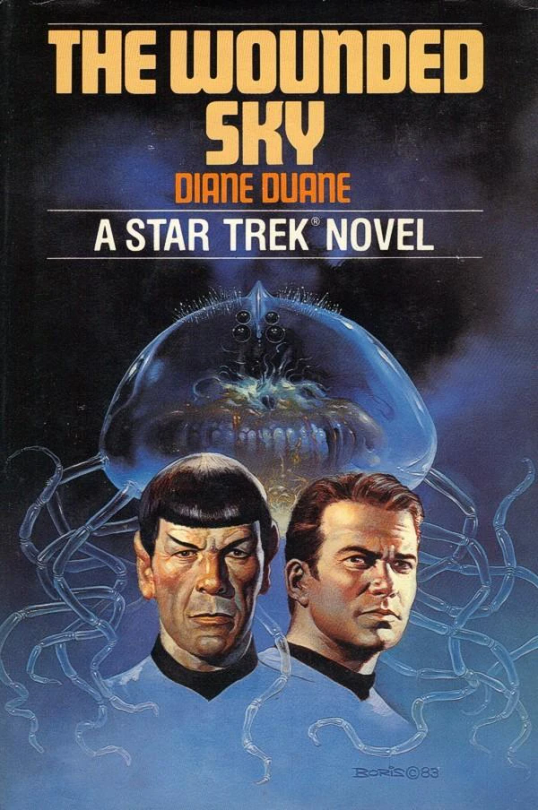
Novel from 1983, by Diane Duane (I had read some TOS comics, and even played a text adventure by this same author, but this is the first novel I read).
Very bizarre, very imaginative. You'd probably have to go back to "Planet of Judgment" (1977) to find a similarly unusual TOS novel. Most of the "action" unfolds inside mental landscapes (and that's not even a proper description; the situation is actually far more complex than that).
At times poetic, at times metaphysical, it's a more difficult novel than the standard TOS light literature, though there are also many humorous moments.
The aliens are remarkable for how truly "alien" they are, which produces lots of absurd (from a human viewpoint) situations. There's a species who only see in infrared, and needs properly heated cards to play poker. A feline alien that doesn't have language to express the passage of time. Another species with twelve sexes, all of them male (specially the ones who bear children). And glass spiders with an altogether different understanding of physics, who spend a lifetime building a nest of memories to pass to their offspring, and then die at the time of mating.
I haven't read any novels by Terry Pratchett, though I know about Discworld from the videogames, but may I say there's something "pratchean" in all this?
In many ways, this is a fascinating novel. But is it a good representative of a Trek novel? I'm not sure.
I feel the scope and the depth of this story is a bit constrained by the Trek frame. The TOS series, and even the movies, had a smaller scope: interpersonal problems, specially among the big three, or political conflicts. The aliens were usually very human, and represented different human societies/worldviews. Even when more alien creatures appeared, like the gas cloud from "Obsession", the story was really about Kirk's very personal demons.
So maybe this novel would have benefitted if it was set in its own, independent sci-fi world, that provided the needed freedom to explore the larger cast and variety the story strives for.
I'll try to summarize the plot, though this is over-simplifying, since "themes" are more important here than "action".
Spoilers under the cut:
The Enterprise is tasked with testing a new revolutionary invention, that will allow ships to travel instantly as far as they want, even outside the galaxy.
The artifact in question works by "inversion", sending the starship to a different dimension where time doesn't exist, and popping it up again at the desired coordinates. Since there's no time involved, there's no damage done to ship and crew. Theoretically.
Well, what could possibly go wrong?
They take aboard the artifact, along with its Hamalki inventor: K't'lk (pronounced "ketelk", I think). She's the glass spider from the cover, and thus far, takes the prize for most unusual "lady of the week".
K't'lk soon becomes best friends with Scotty, though the engineer struggles to understand the nutty physics of the Hamalki.
For his part, Kirk has a conversation with her about the reproductive habits of her species, during which K't'lk weaves a strange crystal sculpture, and gifts it to him.
She also makes a demonstration of the inversion process, without changing the ship's coordinates. But Kirk can't feel anything, except a vague dizziness.
However, soon after leaving the starbase, the Enterprise is attacked by Klingon ships which desire the inversion apparatus. Sulu manages to outmaneuver them, sending the Klingons into a nearby star, which becomes nova right then. The Enterprise escapes the explosion in the nick of time, by activating inversion and leaving the normal plane of existence.
And this time, the crew has indeed strange (but blissful) experiences during inversion. For example, Kirk finds himself living as if he was the starship itself, and this had a conscience of its own.
Upon reappearing in the normal universe, they find out the explosion somehow messed up the coordinates, so they're not anywhere near the Lesser Magellanic, which it was their mission to investigate. Also, the nearby star is going nova too. Coincidence again?
Activating inversion once more, this time they're placed in the correct coordinates. But with each subsequent, longer jump, the inversion experiences are becoming weirder, and individuals start merging with other crewmembers, and seeing things from their viewpoint.
Finally, things get more sinister once Kirk reappears with real wounds, that he thought were just the product of his mind. And even worse, the Lesser Magellanic, now nearby, is showing the most disturbing anomalies.
Entropy has simply ceased to exist at some points. And it seems the longer jumps with the inversion apparatus have caused this, by ripping the fabric of the universe. Thus, a new universe without entropy is sipping through the tear, and threatens to destroy everything. (It's funny how the problem in "The Entropy Effect" was that they had too much entropy, while here they have too little. If they just left it alone...).
K't'lk is sure she can close the rip between both universes, but to do so, they'll need to make a final jump right at the center of the anomaly.
The climax of the story happens entirely inside the mental world of inversion. Which is highly malleable by thought, given the progressive rupture of natural laws. Also, the flux in entropy is represented by ascencing and descending slopes in the landscape.
However, they can't close the rip immediately, since they discover a living, god-like being (called simply "the Others"), who would be destroyed in the process. Before that, Spock must join in a group mind-meld with other crewmembers, to give the Others self-awareness, and explain the situation.
K't'lk must also stay behind with the god, to weave new natural laws for Them to live in. And she puts forth this universe by singing (echoes from Tolkien's "Silmarillion"? might be, since a forest called "Lorien" appears at one point).
Once everything's fixed, and the Enterprise is back in Federation space via smaller jumps (that won't mess up the universe too much), Starfleet decides that the inversion apparatus is way too dangerous in its present state, and must not be used.
Meanwhile, everyone misses K't'lk. But when Kirk accidentally breaks the crystal sculpture that she gave to him, he discovers it was actually an egg. A new, small K't'lk emerges from it, and quickly runs to greet Scotty.
Spirk Meter (or rather McSpirk): 5/10*. During inversion, Kirk gets to see Spock and McCoy's true, deepest natures, and he's in awe with what he finds. First, he's blinded by McCoy's compassion, and the doctor's touch on his arm both reassures and bewilders him. Then Kirk is humbled by Spock's desire of knowledge and his superior mind. The three of them are relieved to find such good qualities in the others' souls.
However, the scene is quite abstract, and seems to be dealing more with the characters as ideas, rather than as specific persons. So I don't find it all that slashy really.
As for Spones as such, there's the moment when Kirk finds them walking together, while inside the anomaly, and Spock looks at McCoy with "nearly unalloyed affection".
Kirk also considers that McCoy is more geared towards receiving, in contrast to Spock's inclination for giving... How convenient for them!
*A 10 in this scale is the most obvious spirk moments in TOS. Think of the back massage, "You make me believe in miracles", or "Amok Time" for example.
21 notes
·
View notes
Text
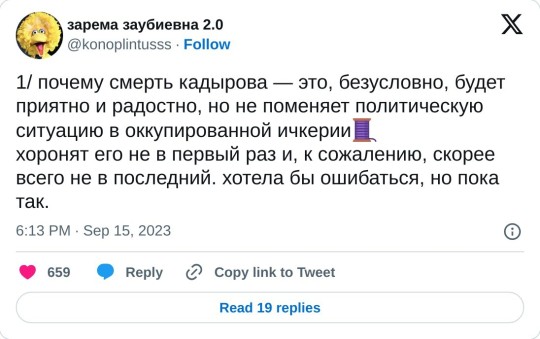
Why Kadyrov’s death will certainly be pleasant and joyful, but will not change the political situation in occupied Ichkeria
This is not the first time they have buried him and, unfortunately, most likely not the last. I would like to be wrong, but so far, this is the case. History shows that the abomination of the human race is tenacious like no other. Kadyrov’s potential death now is simply the death of the governor of the occupying russian government in Ichkeria. If this one dies, they will install a new one. In the same Ukrainian temporarily occupied territories, collaborators explode beautifully, but the army of russian occupiers knows only the language of physical destruction, and to destroy it, you need military and weapons, and also international support.
Whether Kadyrov is replaced by one of his offspring or, for example, a lord or Delimkhanov does not change the situation globally. Primarily because no one withdrew the russian army from Chechnya and the Caucasus as a whole. They weren’t even transferred to Ukraine. In Chechnya, they “love” Putin and Russia so much (and Kadyrov is precisely the russian government) that this requires a regular armed professional army of one hundred thousand. In Chechnya, they “love” Putin (and before that Yeltsin) and Russia so much that they have been destroying a small nation for 30 years.
Today, occupied Ichkeria is an “Akhmat” concentration camp. When russians shout about the “Chechenization of Russia”🤡 they, as usual, can not take russian propaganda out of their mouths. Inhuman torture and genocide were brought to Chechnya by russia and the federals (occupier army), and not vice versa.
Russian propaganda is far from just “Kremlin” - so-called. “Independent” russian media work for the russian world and support for the occupation of Ichkeria - news about every fart of Kadyrov and practically nothing about the Chechen battalions fighting for Ukraine since 2014. There is little about how they torture and kill - unless it is about the persecution of homosexuals. And so they persecute - kidnap, torture, execute - everyone in general.
By the way, about the Lord and Delimkhanov - they, together with Kadyrov, for example, personally torture and rape women. And no, these are not stupid funny clowns. These are terrible cruel people who kill ordinary people with impunity. This is also normal for Westerns. Westerns deport Chechens from the resistance to Russia, who are then tortured and killed there.
Lyulya (Kadyrov) and his image are part of russian propaganda. That clever part of it in which the New York Times publishes an article about “Putin’s opponent” Girkin. “Kadyrov’s men” are part of the russian army, but the “independent Russian media” call it “Chechen troops”🤡
Kadyrov is a squalor and a cruel creature, but they comment on his every fart, making all Chechens look like stupid idiots - only covertly “ч*рки”. They don’t name it, but the image takes shape. Compare Lyulya with Dudayev, Maskhadov, Isa Munayev, Muslim Cheberloevsky - these are the representatives of the “Chechen troops”, this is the army of Ichkeria.
Today, five (!) Chechen units are fighting for the freedom of Ukraine and the independence of Ichkeria, and volunteers keep coming and going - the russ cutter is sacred. And this is the hope for justice. "Why don’t the Chechens rebel?" - that is, military resistance - absolutely fierce, which is now constantly at the forefront of making the russians truly good - is this not resistance? There are only less than two million Chechens - this is the Odesa region in terms of the number of people. Which has been destroyed not only over the last 30 years - cruelly and mercilessly, under the indifference of the rest of the world.
Despite the fact that the world does not care about Ichkeria, the Chechens fight - with weapons in their hands. What can a small people do in Chechnya itself, where a 100,000-strong russian army is fully armed? Once Ichkeria won a war with russia, for which it was punished with institutionalized genocide.
As soon as Ichkeria is not only recognized by the international community but also supported with weapons for military resistance to the russians - then all the occupiers inside and collaborators will be destroyed. In the meantime, we are fighting shoulder to shoulder with the Ukrainians for freedom and independence. Both our struggle and the fact that after such destruction of the nation, there is still resistance in spite of, not thanks to.
Today, we are fighting for the free world. A world without a racist terrorist federation. We have a common enemy. The name of this enemy is russia.
Marşo ya joƶalla.
#stop russian aggression#support ukraine#genocide of ukrainians#genocide of ickerians#ickeria#Chechnya
81 notes
·
View notes
Text
The Evolving Nature of Keywords and Antagonists in Octopath Traveler II
Octopath Traveler II is a masterpiece. I find new ways to appreciate this fact all the time. I hit on one specific facet somewhat recently, so want to walk through each of the main quests and go over the extent to which the creators picked out powerful character-specific keywords which do heavy lifting on multiple levels.
I made a similar post about the keywords from OT1, if you're interested in reading that, but essentially, the "keyword" for a character is a single word chosen to represent their journey. It's used to in OT1 to denote the lead-in to Battle at Journey's End in the climax of a character's route, and in OT2 to fit into their "In Pursuit of _" route boss theme.
The keywords chosen for OT2 have had a lot of thought put into them, and represent not just the journey at a glance but how a character's objectives can change, and even how they relate to their primary antagonist.
(I recommend having the tracklist for the OT2 soundtrack beside you for this, if you're not already familiar.)
Ochette (For Legends)
Ochette is on a journey to find the creatures of legend in order to protect the island. Her journey also takes on meaning for her first chosen companion (Mahina/Akala) and Acta, who become legends in the final act of her journey.
In contrast, her opposite number Petrichor is trying to kill or incapcitate the creatures of legend. Cateracta is the only one that dies on account of her efforts, but Tera and Glacis both suffer at her hands. As does the darkling. Petrichor brings not just death, but suffering on those she seeks. It contrasts nicely with Ochette's first contemporary scene, which has her hunting a gator down specifically for eating too much of the local wildlife and disrupting the balance of the forest. There's a strong ethos about how death is faced, and why a hunt is undertaken. (i.e. to protect the larger environment versus for personal gain)
Hers is the storyline that deals most directly with the balance of life and death, and the importance of a good life and a humane death. In that sense, it's less important for Ochette to directly confront Petrichor because a good life and a humane death can be given regardless of what evils others inflict upon the world.
Castti (For Memories)
Castti, an amnesiac apothecary, is on a journey to restore her lost memories. She's also on her journey to extend a helping hand to those in need, in order to honor the besmirched memory of Eir's Apothecaries.
Her opposite number, Trousseau, was the one to taint Eir's Memory, and his poison has taken hers (either chemically or through trauma). Because his continued actions as a mass poisoner threaten to further sully the memory of Eir's Apothecaries, he needs to be confronted and put down directly for the memories to be laid to rest.
Also, the fact that non-evil Trousseau shows up in her last memory at the end is an indication that it's also a fight for Trousseau's memory in her heart. She can't remember the kind man he once was because it would lead her to hesitate about what needed to be done, but she does want to remember her lost loved ones fondly. Even Trousseau.
Throné (For Freedom)
Throné is fighting for her freedom from the Blacksnakes, and her opposite number, Claude, holds the keys to the collar literally wrapped around her throat. So he has to be fought, for obvious reasons. Fighting him also secures the kind of freedom Throné's never had for the nameless baby whose crying voice can be heard at the end of her route as the camera zooms out.
Still, we see that it's not just Throné suffering under Claude's thumb. We see her adoptive father lost the woman he loved to Claude, and orphans like Mira being raised to take the place of whatever snakes might lose their heads in any given heist.
And, despite the "Not my tits, not my problem" way she handles the power vacuum created by Claude's death, her actions do cause chaos that allows some other Blacksnakes and abused orphans like Mira to break free. Which is not to say they become good. They're still seen running rigged casinos and the like after her path is complete. But hey, freedom to be good implies one also has the freedom to be evil, or else it's not really freedom!
(Sidenote: The baby at the end of Throné's route is such a great narrative tool for pushing the readers to ask more questions. Did Throné originally have qualms about killing Claude due to the power vacuum that the need to free the child overrode? Did seeing the woman first, then her child with Claude, make her realize this would keep happening unless she killed him for real, despite her dislike for killing? Did Claude, a questionably suicidal immortal, engineer the whole setup to erase her doubts about killing him?)
Osvald (For Revenge)
Osvald sets out for revenge and gets his revenge at the climax of his route in a direct confrontation with Harvey, his opposite number and the number one object of his revenge.
This is only somewhat subverted, as Osvald's revenge succeeds in large part due to the power of love (as a father who loves and wants to protect his daughter). Really, revenge being the one goal that doesn't evolve as much fits with Octopath's general "revenge is actually pretty reasonable when you've been wronged to that extent" ethos.
Partitio (For Prosperity)
Partitio is on a journey to bring the world prosperity! Economic well-being! For all his friends. And everyone (save maybe a few shitty loan sharks) is his friend.
But he gets TWO antagonists. Roque is doing it For Wealth (choice of words mine), a similar but distinctly different and much more selfish end. One of the more obscure definitions of prosperity is "attainment of the object desired". Roque was fought because he needed it knocked into his noggin that trains can be good for more than warfare.
Ori has, like him, experienced extreme poverty and suffering (though her experience as a wartime orphan was more extreme) and wants to ease the world's suffering. She just initially prefers to do so by ending the world. However, Ori is never fought because Partitio was always fighting the battle for her heart, knowingly or not. And, at the very last, he reached her. ;_;
Agnea (For Hope)
Agnea Bristarni is on a journey to spread hope. And boy, does she ever!
But she also gets two antagonists. Dolcinea Luciel, the boss of Agnea's route, performs not For Hope, but instead For Applause (The first phase of her boss fight has theme music explicitly called called "In Pursuit of Applause"). It's a form of selfishness that does have to be confronted directly, albeit onstage rather than in an actual fight to the death.
Tanzy, Agnea's other opposite number, has already lost all hope. And that void in her heart was taken advantage of to make her a pawn of the moonshades (and ultimately, a sacrifice). Tanzy remains unfought, because the battle was for Tanzy's hope all along and Arcanette won that fight before the story began.
However, very much worth noting is that Agnea is the one character to not get a "The Journey for _ Ends…" theme on the soundtrack. Instead, her route boss track, juxtaposed squarely between "The Journey for Prosperity Ends" and "The Journey for Truth Ends" is the Song of Hope (which she sings herself!). I think this is a thematic choice that reflects that the hope Agnea strives to bring is more ephemeral as a concept. ("Like trying to grasp hold of a cloud", to paraphrase the ending of Hajime no Ippo.) I think this has a lot to do with why the game has the epilogue. Because while all eight travelers go on living and trying to better the world and themselves in their own way, Agnea's journey for hope continues.
Temenos (For Truth)
Temenos' quest is rather straightforward. He's a detective on a murder investigation. He's looking to discover the truth behind the pontiff's death, behind Roi's death, and eventually behind Crick's death as well.
But in a pretty heavy subversion, his "Journey Ends" track plays in the boss fight with Kaldena, well before he actually gets to the truth. He's the one character of the eight to directly fight his HTAPOTCO counterpart outside of his specific story arc. Because the track was incomplete and his journey for truth wasn't over yet. To add to the synergy, Arcanette was the one most responsible for concealing the truth from him, from the depth of the moonshades' duplicity to the truth of her own identity. And she's already succeeded insofar as her goal was to bring about the endless night, so by the time she's actually fought she's happy to spill all the beans, and you fight her not For Truth, but For The Dawn.
Hikari (For Kingship)
Hikari Ku wants the throne so he can govern with compassion.
He's also the third character to get two antagonists. His brother Mugen is a comically evil king who governs with an iron fist and sends his army to make war with their neighbors. He's fought directly in Hikari's final battle, Hikari becomes king, and he's able to begin repairing the damage and attempting to make a better, more compassionate world.
However, Hikari's opposite number in the moonshades, Oboro/Kazan, has a different view of kingship altogether. Arbuably the center-stage antagonist who gets dialogue prior to Vide's resurrection, Oboro rejects the notion that even a king truly can ease the suffering inherent in the world. It's impossible to change, no matter how hard anyone tries. (After all, he was a master strategist and he did his best strategic thinking to reduce war casualties, but it never did a lick of good.) So, throughout the story, he's helping Hikari's cause without believing in it.
He may be directly confronted in the climax of The Journey For the Dawn, but he's never fought because the battle here was not to gain the throne, but to convince Oboro that Hikari's rule could make a real difference once he was sitting on it.
---
And that's the eight. Wish I could say I could end it on a more profound point, but I don't really have one. I guess, writing this convinced me the story design in OT2 being spot on was very much by design. And the fact it was the result of intentional writer choices and not just an accident makes me feel a deeper connection to the game.
#octopath traveler 2#octopath traveler 2 spoilers#octopath traveler 2 analysis#octopath htapotco#octopath soundtrack thoughts#foolish me only just realized the significance of dolcinea's boss theme after making that OT1 post#this game lives forever in my head
15 notes
·
View notes
Text

BLUE LOCK TAROT ANALYSIS
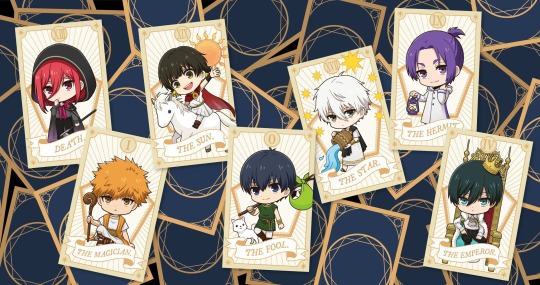
Blue lock Tarot and their numerology analysis post! Since the official art of the illustrations came out for the new merch, I'm surprised to see the boys in all Major Arcana cards that resonate their personality through each of them. Major Arcanas in tarot are the Nature in all the richness of its infinite possibilities, and there is in it as in Nature, not one but all potential meanings. These meanings are fluent and ever-changing. Major Arcanas also represents the human consciousness, these kinds of cards you'll see in a tarot set. Major Arcanas are the full-time cards that hold your life choices and other changes that resonate within you. So, let's start

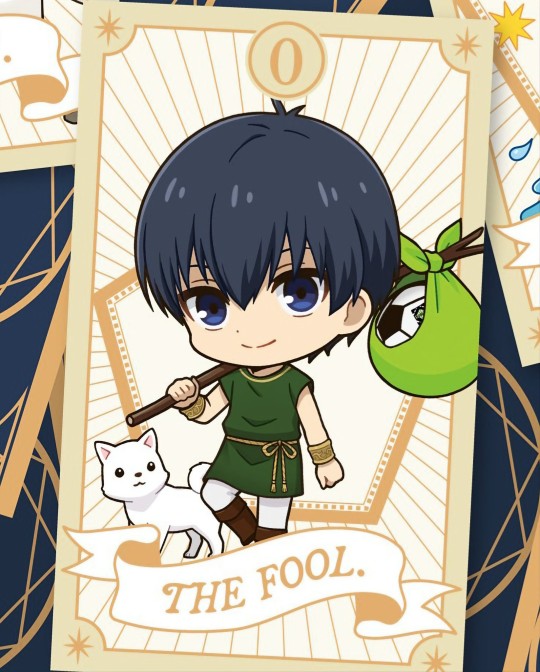
It's no to surprise that Isagi's Major Arcana is "The Fool" numerology stands for is the unnumbered card 0, this represents The Fool as the main character of the Major Arcana and makes his journey through each of the cards, meeting new teachers and learning new life lessons along the way, and eventually reaching the completion of his journey with the World card. This is known as the Fool's Journey and is a helpful way of understanding the story line of the Major Arcana Tarot card meanings. This makes sense as he is the MC of Blue lock, and better yet, noticing his rank place in the facility is 299! Also, meaning to say that Isagi, being the Fool, resonates his improvements and meets new players within the Blue Lock facility, holds guidance, and stepping stone to his adventures.
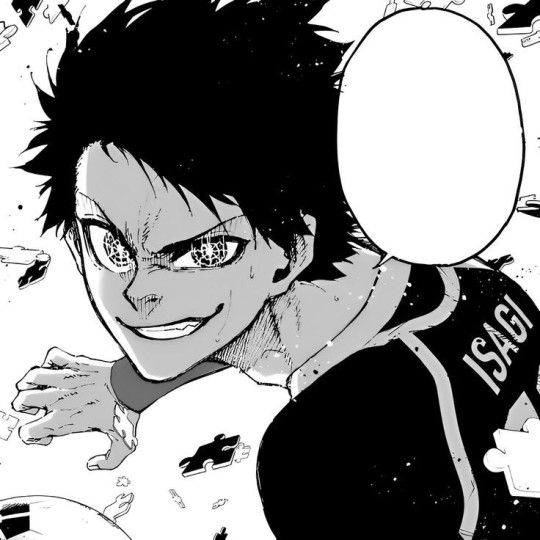
As it stems moving in the numerology 0, the standing number of the fool card. 0 is a symbol of nothingness or complete freedom from limitations. In numerology, it is often referred to as the void, as it represents potential and choice. It most likely means that positive change is on the way. This connects to Isagi's rational and spatial awareness when it comes to see or he predicting his next goals in soccer. But when in reverse, "The Fool" card, it serves as a call to reevaluate your intentions, motivations, and inner guidance. It prompts you to examine if you might be holding back due to concerns about others' opinions or unrealistic expectations.
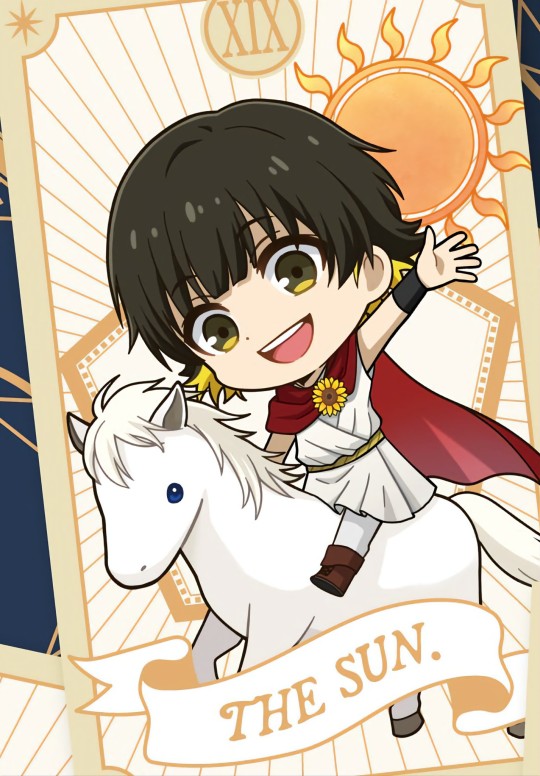
This makes total sense of Bachira's Major Arcana that he is "The Sun" numerology is 19. This card is generally considered positive. It is said to reflect happiness and contentment, vitality, self-confidence, and success. Sometimes referred to as the best card in tarot, it represents good things and positive outcomes to current struggles. In this case, we know how Bachira is full of his enthusiasm. As Bachira being the sun card resonates his positive nature of being himself. Glowing his self-acceptance like how he surfaces his inner monster to create his unique ways towards Blue Lock. In the reversed position, the Sun indicates of significant difficulties finding positive aspects to certain situations. The clouds might be blocking out the warmth and light that needs to progress. This might be preventing from feeling confident and powerful. May experience certain setbacks which are damaging your optimism and enthusiasm. In numerology, 19 defines as highly ambitious and have a strong drive for success and power.
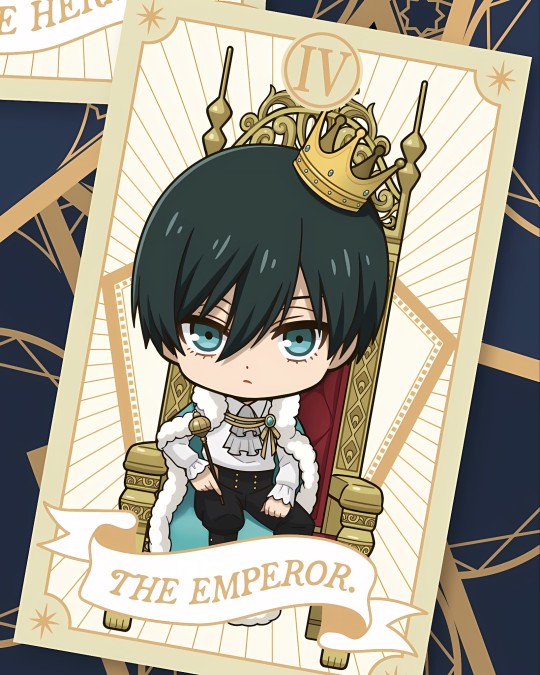
I'm a bit surprised to see Rin having the emperor card here. So the emperor card often represents a mature figure seated on a throne or a soldier holding a shield and sword. This card signifies responsibility, courage, and intelligence. Sometimes, it can even symbolize a real person in your life, like a corporate executive, a political leader, or a respected warrior. It really personified Rin in the truly card because of his own goals and what he can do in his ways to achieve them — like an emperor conquering what he does at best to prove which it is no doubt! This card is suggestive of stability and security in life. You are on top of things and everything in under your control. It is the essence of hard work, discipline and self control that have bought you this far. It means that you are in charge of your life now setting up your own rules and boundaries. This takes place as to what Rin stabilize himself to be better at his game in soccer. He would do whatever it takes to be on top of his league just like that.
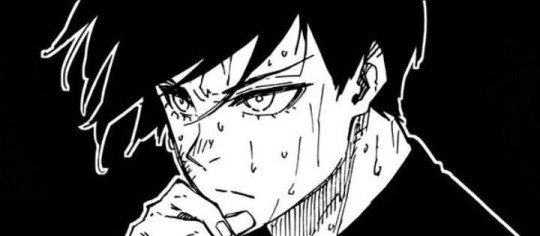
When in reverse the card can be tyrant, domineering, rigid, stubborn, lack of discipline, recklessness. Definitely describes Rin as his stoic and unfriendly behavior shows within the series. Number 4 is the standing number of this major Arcana card meaning Memory. Logical mental reasoning by the physical man full of Spirit. Being able to express oneself in a socially accepted way in the material universe. Measurement. The reality of life on earth and being able to express oneself in it.
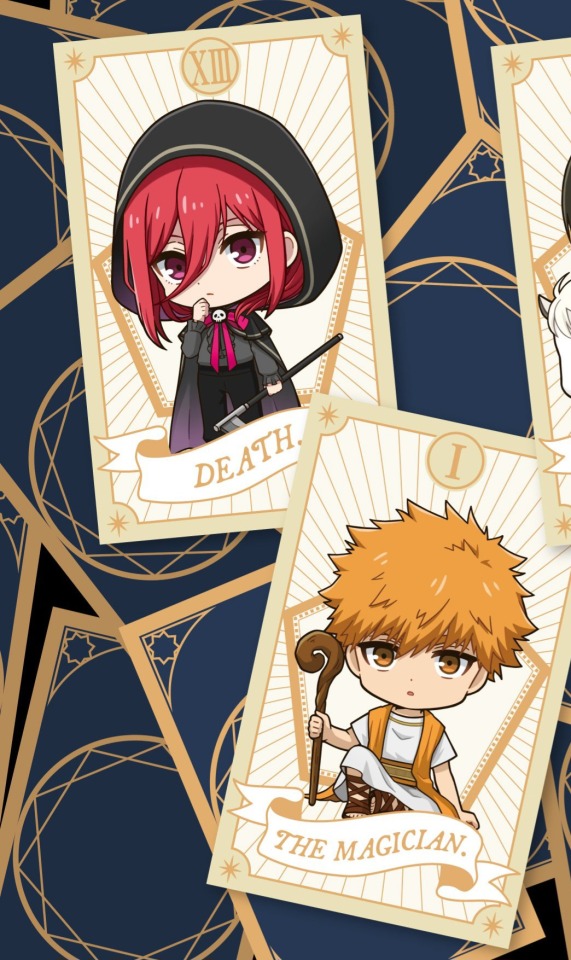
Now let's move onto KuniGiri cards, respectively they are "The Death" (13) and "The Magician" (1). But, first let's start with Kunigami first.
Kunigami takes the first numbered major Arcana card which is the Magician, the Magician is one tarot card that is filled with symbolism. The central figure depicts someone with one hand pointed to the sky, while the other hand points to the ground, as if to say "as above, so below". This is a rather complicated phrase, but its summarization is that earth reflects heaven, the outer world reflects within, the microcosm reflects the macrocosm, earth reflects God. It can also be interpreted here that the magician symbolizes the ability to act as a go-between between the world above and the contemporary, human world. Indeed as the Magician bestows there's balance in between the space of human nature meaning this interprets Kunigami's personality depicted as the hero or so well term for his respective mannerism that being differed from the facility. The Magician also has the potential innate to the fool! Speaking of how he and Isagi before the previous interactions and now in their NEL matches that made changes of how they build-up together as 0 and 1 are closely in order of the major arcanas. It is hard to believe that in the reverse of the Magician implies as manipulation, cunning, trickery, wasted talent, illusion, deception. Which we all know what Kunigami put himself into the wildcard in the present chapters. 1 in numerology represents fiercely independent, competitive, determined, value their freedom, are original, have leadership qualities, are self-reliant, etc. Number 1's, can accomplish whatever they set their minds to. They are perpetually brimming with new ideas and this is what gives them happiness.
On Chigiri's analysis of "The Death" card, death is one of the most feared cards in a Tarot Deck, and it is very misunderstood. Many people avoid mentioning this card because it has that much power. Most times, people take the name of the card literally. However, the real meaning within the Death card is one of the most positive in the whole deck. The Death card signals that one major phase in your life is ending, and a new one is going to start. Leaving to close one door, so the new one will open. The past needs to be placed behind you, so you can focus your energy on what is ahead of you. Perfectly fitting for our princess Chigiri as it reminds me of how his past brings a burden for him, in the ACL injury incident that thought himself that he wouldn't be the genius at soccer he wouldn't be. But let alone he was free after taking another new form of himself as a "rebirth" or transition of his new path in Blue Lock! The old version needs to ‘die’ to allow the new you to be created. This can be a scary time for you because you may be unsure of what will happen in the future. Even if you are scared, you should welcome the change because you are opening the door to new life events.
The Death reversal meaning is still about change, but that you have been resisting it. You could be worried about letting go of the past, or could not be sure of the changes that needs to make to go forward. Resisting the change and holding onto the past can limit your future, which can cause you to feel like you are in limbo. Man, if this ain't Chigiri when he is contemplating when he should run like before or nah well it resonates his hesitation during the previous chapter where he is afraid of breaking another limb or he will quit soccer. But that's a beautiful trump card he got imo. Thus, the number 8 of the card indicates major changes.
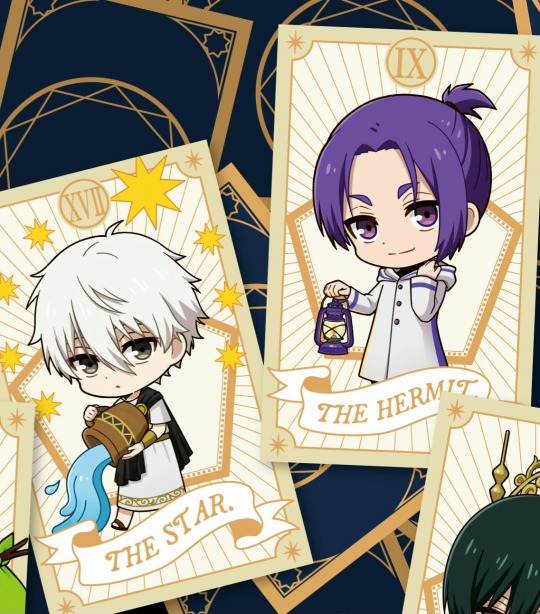
Lastly, NagiReo. Nagi resonates the star card (17) while Reo is the Hermit (9). So let's analyze first Nagi's cause it's really interesting. So The Star card defines within the tarot embodies a sense of hope, inspiration, and profound positivity. It signifies a renewal of spirit, bringing forth calmness, serenity, and an optimistic outlook for the future. This is a time of significant personal growth and development as you are now ready to receive. I see that no wonder The Star card is on Nagi is he symbolizes what we know him as the potential lazy genius player that today in his self-development grind to where he is today being motivated and finding his purpose goal in attaining to reach the blue lock ego level and yet being the best of the best as he changes throughout every chapter. In the reverse is what we get as his usual unmotivated self the opposite of the tarot. The Star Reversed can mean that you’ve lost faith and hope in the Universe.
The numerology of the star card means of the number 17, which reduces to 8. The number 8 is about power and success.
Reo's card being The Hermit respectively is the "withdrawal from events and relationship to introspect and gather strength." Seeking the inner voice or calling upon vision from within. A need of understanding and advice, or a wise person who will offer knowing guidance. A card of personal experience and thoughtful temperance. This goes to the ideals and plans that Reo visualize with Nagi when they set foot to play football and has a calling for having Nagi being his best duo when it comes at all times. It really resembles how Reo defines the Hermit card. The hermit's appearance in a reading can also denote the appearance of someone who will come to your life that will be your mentor. In reverse, the Hermit card stems, loneliness, exile, withdrawal from loved ones, misfits, and sadness. In the numerology, the number 9 is powerful. It represents completion, although not a final ending—more like the fulfillment of one cycle so that you can prepare to initiate the next one. It's a recognition of life's ongoing ebb and flow.
That's all for the analysis of this post! What do you all think?
#anime / manga#blue lock#bllk#blue lock anime#blue lock manga#blue lock analysis#bllk analysis#blue lock tarot analysis#☆૮꒰ˊᗜˋ* ꒱აelisestheories
35 notes
·
View notes
Text
So to pass the time lately I played through Lies of P for the first time
And of course, me being me, I proceeded to make everything about the game gay
Tho what started as just "I think Carlo and Romeo are exes" and "Eugenie needs a girlfriend" turned into an actual honest to fuck queer reading after that final boss fight
tl;dr: Lies of P is to trans femmes what original Pinocchio is for trans mascs
but to explain my insanity I'm gonna have to spoil the shit out of the game soooooo you've been warned
Okay so for the sake of simplicity I'm gonna refer to Geppetto's son as Carlo and to the protagonist of the game as P. I know they have literally the same soul, but they don't share memories and don't seem to share a sense of identity, so I'm gonna treat them as different people here
Also it's important for The Symbolism, so bear with me here
So our dear P is this new person who is slowly building a sense of identity for himself, this being represented by you slowly growing more human the more you do certain things in the game
Like enjoying music, and lying to people
You know, normal human stuff
This eventually leads to one of the first big changes in P's character design. P grows his hair out, much to Geppetto's frustration.
Because P no longer looks like Carlo. He's starting to differentiate himself from the person Geppetto expects his son to be.
This tension between P's growing sense of self, and Geppetto's expectation for P to just turn into this image he has of Carlo, just continues to escalate
Culminating on the final boss fight against The Nameless Puppet
Carlo's corpse being used by Geppetto to claim back his son's soul
And that's when the old man says a line that makes me rethink who P and Carlo are
"This freedom isn't for you. It's for Carlo"
and you know, there's something about how to claim your freedom and keep your soul, you have to fight and defeat your own masculine body, which is being puppeteered by your controlling father, who has very strong opinions about who you're supposed to be
ESPECIALLY when said father keeps calling you a male name that is no longer yours
ESPECIALLY ESPECIALLY when the very first thing you do after that is sacrifice yourself so that your soul can be reborn in a feminine body
And like okay maybe this could be interpreted as kinda bad, because the way you unlock this ending is by lying through your teeth repeatedly, so it could kinda imply that P's new identity is a lie
But you gotta remember that nearly every lie she tells are just white lies to help people deal with a miserable fucking situation. And the only lies she tells about herself are all for the sake of self preservation
Like her first lie is her trying to get the security systems of the hotel from killing her
And her last lie is her telling her dad she trusts him
In the end P feels like a transfemme with a very strained relationship to her father, who still only sees her as "Carlo", the son he insists she should be.
Honestly there's probably a lot to be said about P and Carlo's relationship to Romeo, as well as Sophia's role in this story, but I'd need to play through the game again to get all the specific interactions aaaaand I don't feel like playing a video game twice back to back
fucking sue me
Anyways Lies of P is good and very easily read as queer, and you guys should definitely try it
29 notes
·
View notes
Text
for real, fuck charles xavier, magneto was right, and this shit ain't changed since x-men's conception, periodt
for those who have watched the latest episode of X-Men '97 i feel Some Type of Way about what's about to happen and i gotta rant
oh my god this is SO predictable, the timing is too impeccable, maybe it's because i have always valued Erik and his perspective on mutantkind but i thoroughly believe that it is Erik with the mutants' best interests in mind. Has it been a little selfish? Perhaps, I'll even let you say it is sometimes heavyhanded, but it was always in the protection of mutants, he even said it himself, he acts hostile only as a retaliation, not instigation.
And so Charles is "dead' and Erik inherits the X-Men, right, okay. And now Erik "declares war" and who should appear but fuckin Charles Xavier--and you KNOW what's going to happen, he's going to immediately throw himself on the pyre of pacifism for the greater good, he's gonna BEG Erik to reconsider warning that going too far will destroy all the trust that mutants have built up to this point (which for the record has always been WAVERING at best), and Erik is going to look bad and extremist when his reaction to the current world events is completely valid as is his anger! Genosha is in ashes, a country of his people died, Erik has been through this before, you SAW the number on his arm, yall KNOW what that means!
Charles is gonna be so naive to it all, but the fact is Bastion has thrown down the gauntlet, that man is very 'get them before they get us' and hasn't been the only one to do that to mutants, the Mutant Replacement Theory (which...i can't help but look at that and shake my head, like, X-Men has always been meta but god DAMN, y'know?) rhetoric is rampant in this series. The LAST thing we need is Charles spouting the fragility of human-mutant relations and expecting mutantkind, specifically the X-Men, to take some sort of moral high ground when the villains we're dealing with in this series in particular have already shown that it will not work.
I guess it's easy to place myself in the narrative as someone represented by marginalized groups, it's easy to get...angry at this, because you see your own world in it with all it's flaws. But our world has taught us time and time again that no tyrant or oppressor will be convinced of our validity by a handshake, at so many points in history we have had to fight for liberty, dignity, and the freedom to just exist. I just don't want to see the rest of the series devolve into 'oooooo no stop you can fight that hard it'll make us look bad ooooooooo' because like..what would you have them do otherwise, y'know?
18 notes
·
View notes